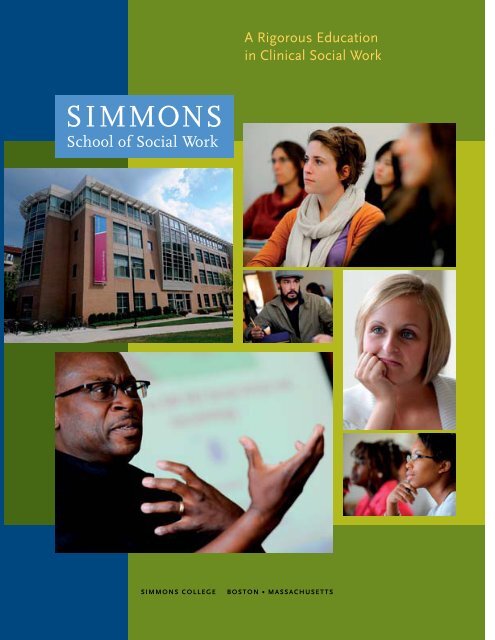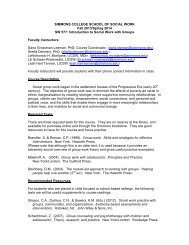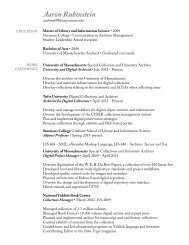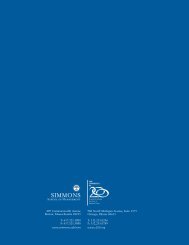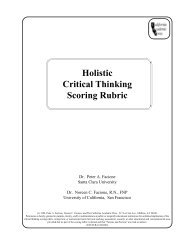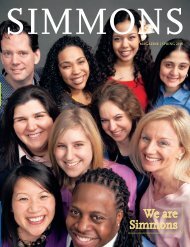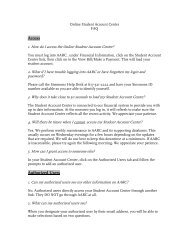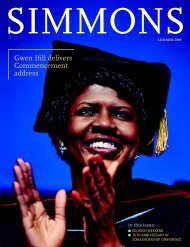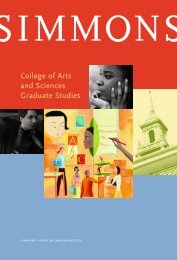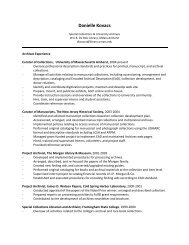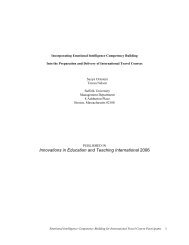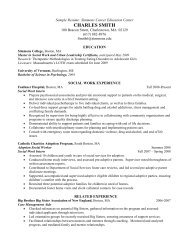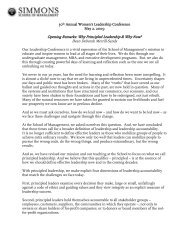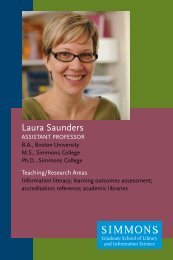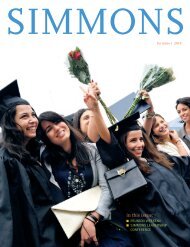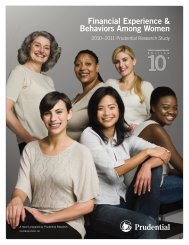School of Social Work - Simmons College
School of Social Work - Simmons College
School of Social Work - Simmons College
Create successful ePaper yourself
Turn your PDF publications into a flip-book with our unique Google optimized e-Paper software.
A Rigorous Education<br />
in Clinical <strong>Social</strong> <strong>Work</strong><br />
<strong>School</strong> <strong>of</strong> <strong>Social</strong> <strong>Work</strong><br />
SIMMONS COLLEGE<br />
BOSTON MASSACHUSETTS
The <strong>Simmons</strong><br />
Advantage<br />
Acclaimed training in clinical social work<br />
<br />
<br />
<br />
<br />
<br />
<br />
<br />
Outstanding and diverse faculty who are<br />
active practitioners, scholars, and researchers<br />
Low student-to-faculty ratio<br />
Full-time and extended-study options<br />
Evidence-based approaches to clinical<br />
challenges<br />
Advanced-standing option for B.S.W.<br />
graduates<br />
Interdisciplinary and dual-degree options in<br />
business and public health<br />
Small, accessible campus in the heart <strong>of</strong><br />
Boston and the Longwood Medical Area
SIMMONS SCHOOL OF SOCIAL WORK 1<br />
2 An educational promise to place you,<br />
the student, first<br />
page 3<br />
Message from the Dean<br />
5 Our student body: a diverse community<br />
<strong>of</strong> dedicated people<br />
8 Our vibrant academic community<br />
supports—and inspires<br />
page 9<br />
Degrees Offered<br />
page 10 Faculty Highlights<br />
page 13 Faculty<br />
page 14 Master <strong>of</strong> <strong>Social</strong> <strong>Work</strong><br />
page 17 M.S.W. Clinical Specializations<br />
page 21 M.S.W./Urban Leadership Certificate Program<br />
page 22 Advanced-Standing Program<br />
page 23 Interdisciplinary and Dual-Degree Options<br />
page 24 Special Courses<br />
page 26 Field Education<br />
page 30 The Doctoral Program<br />
32 A lifetime <strong>of</strong> connections for personal<br />
and pr<strong>of</strong>essional growth<br />
35 Boston—life at its fullest<br />
36 Admission and financial aid<br />
information
WWW.SIMMONS.EDU/SSW 2<br />
An educational promise<br />
to place you,<br />
the student, first<br />
At <strong>Simmons</strong>, we pledge to help you achieve a successful career, a<br />
meaningful life, and a powerful return on your educational investment.<br />
Our program is distinguished in many ways: an innovator in social<br />
work education; nationally acclaimed faculty; alumni who are leaders in<br />
their fields; and an ideal Boston location in the Fenway and Longwood<br />
Medical Area.<br />
We make sure that you have direct and frequent access to faculty who<br />
know your name and understand your goals. Small classes, case-based<br />
discussions, experiential learning, seminars, and student task forces contribute<br />
to the personal and very practical learning experience at <strong>Simmons</strong>.<br />
The <strong>School</strong> <strong>of</strong> <strong>Social</strong> <strong>Work</strong> (SSW) is highly regarded for its fieldwork<br />
approach, which allows students to experience in-depth training in social<br />
service settings. We also <strong>of</strong>fer a supportive and distinctly collaborative<br />
academic community one rarely finds at larger universities.<br />
Bottom line? We want you to succeed.
SIMMONS SCHOOL OF SOCIAL WORK 3<br />
Message from<br />
the Dean<br />
Dear Prospective Student,<br />
Our <strong>School</strong> <strong>of</strong> <strong>Social</strong> <strong>Work</strong> is distinguished<br />
by its emphasis on preparation for clinical<br />
practice, by its high educational standards,<br />
and by a school culture that values and is<br />
shaped by its diversity. We are proud <strong>of</strong> our<br />
100-year history <strong>of</strong> leadership in social work<br />
education and our role in shaping the social<br />
work pr<strong>of</strong>ession.<br />
<strong>Simmons</strong> is still leading the way today. We<br />
have on our faculty a Fulbright Scholar, two<br />
Hartford Scholars, two past presidents <strong>of</strong><br />
the Massachusetts Chapter <strong>of</strong> the National<br />
Association <strong>of</strong> <strong>Social</strong> <strong>Work</strong>ers (NASW),<br />
one past national NASW president, and<br />
the current president <strong>of</strong> the International<br />
Federation <strong>of</strong> <strong>Social</strong> <strong>Work</strong>ers.<br />
Faculty research and scholarly interests span<br />
a broad array <strong>of</strong> issues: domestic violence,<br />
health care disparities, trauma, HIV/AIDS,<br />
child welfare, social work leadership, gerontology,<br />
evidence-based practice, ethics,<br />
genetics, and immigration. Our innovative<br />
M.S.W. Program includes a social action<br />
requirement, opportunities for international<br />
study, an Urban Leadership certificate option,<br />
and clinical field education placements<br />
in nearly 300 varied social service settings.<br />
We provide opportunities for students to<br />
focus their studies in one <strong>of</strong> four areas<br />
<strong>of</strong> clinical specialization. Our new B.S.W.<br />
Program is designed to prepare social workers<br />
for generalist practice and to provide<br />
a strong foundation for social work career<br />
advancement.<br />
Our Doctoral Program prepares experienced<br />
social workers for careers in research and<br />
higher education. Most importantly, <strong>Simmons</strong><br />
attracts people who want to work<br />
directly with individuals, families, and communities<br />
and who understand that the pr<strong>of</strong>ession’s<br />
commitment to social justice <strong>of</strong>ten<br />
requires practitioners to have a high level <strong>of</strong><br />
social activism and civic engagement.<br />
Daily, our students, faculty, and alumni work<br />
to effect social change and improve lives.<br />
We will encourage and challenge you to do<br />
the same. I invite you to consider <strong>Simmons</strong><br />
for your social work education. We are<br />
confident that you will feel supported and<br />
inspired by our vibrant academic community<br />
and will leave us well-prepared to engage<br />
in pr<strong>of</strong>essional social work practice.<br />
Stefan Krug, M.S.W., Ph.D.<br />
Dean and Pr<strong>of</strong>essor<br />
B.A., University <strong>of</strong> California, Santa Cruz<br />
M.S.W., <strong>Simmons</strong> <strong>College</strong> <strong>School</strong> <strong>of</strong> <strong>Social</strong> <strong>Work</strong><br />
Ph.D., <strong>Simmons</strong> <strong>College</strong> <strong>School</strong> <strong>of</strong> <strong>Social</strong> <strong>Work</strong>
WWW.SIMMONS.EDU/SSW 4<br />
Flexing Her Options:<br />
Dominique Watson ’10 M.S.W.<br />
Clinical <strong>Social</strong> <strong>Work</strong>er, Boston Emergency Services Team,<br />
Boston, Massachusetts<br />
After graduating from Smith <strong>College</strong> in 2006, Dominique Watson<br />
landed a job in the IT industry. However, with a mother who’s a case<br />
manager, a brother who’s an adolescent counselor, and a sister-inlaw<br />
who’s a recent SSW grad, it wasn’t long before she found herself<br />
more interested in working with people than PCs.<br />
Easing into academia: Watson admits, though,<br />
that she wasn’t ready to jump into a full-time M.S.W.<br />
program. Her solution: <strong>Simmons</strong>’s flexible extended-study<br />
program, which <strong>of</strong>fers students the option<br />
to start part time. “I took classes at night or on<br />
Saturdays,” says Watson. “This allowed me to stay<br />
at my job and warm up to a full schedule.”<br />
Prestigious placements: Watson quickly caught her<br />
family’s passion for the work. Field placements at<br />
an elementary school and an adult outpatient clinic<br />
at Boston Medical Center provided a rigorous and<br />
stimulating foundation in clinical practice. Citing<br />
Cognitive Behavioral Approaches & Treatments<br />
and Realities <strong>of</strong> Racism and Oppression as favorite<br />
classes, Watson reports that <strong>Simmons</strong>’s strong<br />
integration between coursework and clinical placements<br />
taught her “to connect to a client in crisis.”<br />
Faculty who care: As graduation neared, <strong>Simmons</strong><br />
connections led Watson to several employment<br />
opportunities. In addition to a SSW career<br />
fair resulting in two <strong>of</strong>fers, she says that Associate<br />
Pr<strong>of</strong>essor Linda Sanford and Assistant Pr<strong>of</strong>essor<br />
Dawn Belkin-Martinez were especially helpful with<br />
advice and leads. Even after graduation, she receives<br />
emails from these faculty members about upcoming<br />
pr<strong>of</strong>essional events.<br />
In the end, Watson accepted a position at her internship<br />
site, Boston Medical Center. As a member <strong>of</strong><br />
its Boston Emergency Services Team (BEST), she<br />
responds to crisis calls throughout the city. This rich<br />
and exciting work, says the Boston native, affords<br />
her the most satisfying connection <strong>of</strong> all: “I love that<br />
I can give back to the community.”
SIMMONS SCHOOL OF SOCIAL WORK 5<br />
Our student body:<br />
a diverse community<br />
<strong>of</strong> dedicated people<br />
The SSW is committed to celebrating and building a diverse school<br />
community. Our students, faculty, and staff are comprised <strong>of</strong> people from<br />
different ethnicities, races, classes, and backgrounds. Many SSW students<br />
are experienced human service pr<strong>of</strong>essionals who seek additional education<br />
for personal and pr<strong>of</strong>essional growth. Others are career changers, making<br />
the transition to a more meaningful vocation. Yet some other students with<br />
work or volunteer experience enter the SSW Program soon after completing<br />
their undergraduate degrees.<br />
All come together in a small class environment that creates a spirited<br />
learning community. Students receive the support and challenge needed<br />
to develop their social work skills and, ultimately, to become skilled clinical<br />
practitioners. They gain knowledge <strong>of</strong> new theories and paradigms for understanding<br />
themselves, society, and their clients. They learn about diversity<br />
in the classroom and in field placements and embrace the opportunity to<br />
connect with others who have very different life experiences.<br />
Our students share a passion for scholarship, a commitment to community,<br />
and a vision for change. They help others overcome life’s most difficult<br />
challenges.<br />
They make a difference in the world.
WWW.SIMMONS.EDU/SSW 6<br />
Activities that complement learning<br />
A SSW education is not confined to field placements and the classroom. Within our dynamic<br />
school community, students take advantage <strong>of</strong> a variety <strong>of</strong> social and educational <strong>of</strong>ferings.<br />
The student government actively partners with faculty to develop regular events, such as:<br />
Student/faculty colloquia: Faculty present scholarly work and exchange ideas with<br />
students at informal wine and cheese gatherings.<br />
GLBT Week: Linked to that week’s classroom learning, GLBT Week is an array <strong>of</strong> activities<br />
designed to raise consciousness and build community. Activities have included a student<br />
panel on coming-out experiences, a student-run workshop titled “Transgendered 101,” and<br />
a photo exhibit from the Family Diversity Project.<br />
Art & Life: The Gallery at the SSW: Several social work-themed shows are produced<br />
every year and curated by faculty and students. Recent examples include an exhibit <strong>of</strong> drawings<br />
by children from a Darfur displaced-person camp and a show <strong>of</strong> SSW student artwork.<br />
Diversity Week: This week <strong>of</strong> activities celebrates the SSW commitment to diversity.<br />
Recent programs include an international-themed community lunch, a presentation by<br />
Muslim students on their experiences at <strong>Simmons</strong>, and a panel on immigration activism<br />
in the Boston area.<br />
Theater nights: Students and faculty attend local productions, such as Harriet Jacobs,<br />
a play based on a slave diary, staged at a Cambridge theater.<br />
“ Many <strong>of</strong> my clients are dealing with substance abuse,<br />
complex medical problems, or mental illness, in<br />
addition to their HIV/AIDS diagnosis. The well-rounded<br />
clinical foundation I got at <strong>Simmons</strong> has prepared<br />
me for any social work position. The school exposed<br />
me to many different practices and therapies and helped<br />
me to find my voice. If you’re looking to do clinical<br />
practice, there is no better place to be.”<br />
NATHAN BREWER ’10 M.S.W.<br />
CLINICAL ADVOCATE, AIDS ACTION COMMITTEE OF MASSACHUSETTS
SIMMONS SCHOOL OF SOCIAL WORK 7<br />
A Meaningful Place:<br />
Matthew McCall ’07 M.S.W./Urban Leadership Certificate Program<br />
Senior Consultant, <strong>Work</strong>force Learning and Development, The Home for Little Wanderers, Boston, Massachusetts<br />
A 2007 graduate, Matthew McCall works as a senior consultant advising on clinical<br />
practices and services at the Home for Little Wanderers, New England’s largest child<br />
and family agency.<br />
“<strong>Simmons</strong> changed me into someone who not only can handle the responsibility<br />
for agency-wide clinical training and oversight, but also program management and<br />
operation,” he says. “I’m able to develop a vision for the Home.”<br />
Learning to lead: According to McCall, the SSW’s<br />
innovative curriculum on children and families and<br />
the Urban Leadership Certificate Program’s emphasis<br />
on facilitating change ably prepared him for a<br />
position in the agency’s administration. As part <strong>of</strong><br />
his management responsibilities, he’s stepped in<br />
to oversee a residential treatment program through<br />
a time <strong>of</strong> transition, established philosophies <strong>of</strong><br />
treatment, and forged community and educational<br />
partnerships.<br />
“To help kids, you also need to be effective with<br />
families and communities,” says McCall. “<strong>Simmons</strong><br />
gave me that specialized skill set.”<br />
An invaluable resource: McCall retains strong<br />
bonds to <strong>Simmons</strong>. He’s referred families to classmates<br />
at other agencies and called up faculty members<br />
Gary Bailey and Michael Melendez for insight<br />
into practice issues. A SSW librarian helped McCall<br />
locate some difficult-to-find research — and mailed<br />
it. “Even though I’ve graduated, <strong>Simmons</strong> remains<br />
committed to me and the work I’m doing,” he says.<br />
Daily inspiration: McCall praises the SSW for<br />
encouraging students to think hard about what it<br />
is that motivates them — and to carry their answer<br />
forward into their careers. McCall’s hasn’t changed:<br />
“Despite everything that they’ve experienced, the<br />
kids at the Home are so resilient and enthusiastic,”<br />
he says. “If I can be part <strong>of</strong> that — even in a small<br />
way — what an incredible thing to do with my life.”
WWW.SIMMONS.EDU/SSW 8<br />
Our vibrant academic<br />
community supports —<br />
and inspires<br />
The SSW faculty are accomplished, devoted leaders. They’re experienced<br />
clinicians, researchers, and scholars who love to teach and who draw on rich<br />
practice and research experience to illuminate classroom lessons.<br />
Teaching for us are a Fulbright Scholar, two Hartford Scholars, two past<br />
presidents <strong>of</strong> the Massachusetts Chapter <strong>of</strong> the National Association <strong>of</strong><br />
<strong>Social</strong> <strong>Work</strong>ers (NASW), one past national NASW president, and the current<br />
president <strong>of</strong> the International Federation <strong>of</strong> <strong>Social</strong> <strong>Work</strong>ers. Equally committed<br />
to service as they are to scholarship, the SSW’s abundantly talented<br />
faculty members <strong>of</strong>fer extensive field-tested experience.<br />
Their research and scholarly interests span a broad array <strong>of</strong> social issues,<br />
from addiction and gerontology to trauma and immigration. Often the “go to”<br />
resource in their area <strong>of</strong> expertise, our pr<strong>of</strong>essors publish widely in premier<br />
social work journals, present at major symposiums, and organize conferences<br />
on urgent issues such as interpersonal violence and health care disparities.<br />
For 100 years, we’ve led the way in social work education. Every day,<br />
our students, faculty, and alumni strive to implement social change and<br />
improve lives.<br />
We’ll help you fulfill your goals — and find your voice.
Degrees Offered<br />
Master <strong>of</strong> <strong>Social</strong> <strong>Work</strong><br />
<br />
<br />
<br />
<br />
M.S.W./Urban Leadership Certificate Program<br />
Interdisciplinary <strong>Social</strong> <strong>Work</strong>/Public Health<br />
Training Opportunity with the Harvard <strong>School</strong> <strong>of</strong><br />
Public Health<br />
M.S.W./MBA<br />
Ph.D. in <strong>Social</strong> <strong>Work</strong>
WWW.SIMMONS.EDU/SSW 10<br />
Pr<strong>of</strong>essors who practice what they teach<br />
Quality education begins with quality teachers. The SSW faculty will help you prepare pr<strong>of</strong>essionally<br />
because they are successful pr<strong>of</strong>essionals themselves — and because they are<br />
dedicated to teaching and mentoring students.<br />
SSW pr<strong>of</strong>essors are actively engaged as clinicians, consultants, educators, researchers,<br />
and community leaders. Their research, scholarship, and experience cover a wide range <strong>of</strong><br />
issues, including child welfare, pediatric chronic illness, gerontology, health care disparities,<br />
trauma, HIV/AIDS, refugees, family bereavement, racism and oppression, social work leadership,<br />
evidence-based practice, and social policy in the United States and around the world.<br />
Our faculty serve on the boards <strong>of</strong> numerous agencies and organizations, such as the<br />
AIDS Action Committee, the National Association <strong>of</strong> Black <strong>Social</strong> <strong>Work</strong>ers, and the Episcopal<br />
City Mission.<br />
Highly accessible<br />
All faculty <strong>of</strong>fices are located in the SSW building to provide students<br />
with direct and frequent contact with pr<strong>of</strong>essors outside <strong>of</strong> the classroom.<br />
Says Melissa Sorrell-Kimble, ’11 M.S.W.: “The <strong>Simmons</strong> faculty<br />
are very supportive and available. Whether it’s by email, over the<br />
phone, or meeting on campus, they’re there to help you.”<br />
FACULTY HIGHLIGHTS<br />
Associate Pr<strong>of</strong>essor Gary Bailey is the first African-<br />
American and the first American in 20 years to be<br />
elected president <strong>of</strong> the International Federation <strong>of</strong><br />
<strong>Social</strong> <strong>Work</strong>ers.<br />
Dana Leeman<br />
Assistant Pr<strong>of</strong>essor<br />
Lynn Sanford<br />
Associate Pr<strong>of</strong>essor<br />
Pr<strong>of</strong>essor Ruth Grossman Dean volunteers as a<br />
clinician at Boston’s South End Community Health<br />
Center and recently completed a qualitative study <strong>of</strong><br />
suicide prevention work with homeless youth at an<br />
urban agency.<br />
Pr<strong>of</strong>essor Mary Gilfus has been investigating the<br />
effects <strong>of</strong> domestic violence for more than 30 years<br />
and works with Jane Doe Inc., the Massachusetts<br />
Coalition Against Sexual Assault and Domestic<br />
Violence. Her current research interests include social<br />
work practice and domestic violence services in Cuba.<br />
Assistant Pr<strong>of</strong>essor Thom Harrigan works with adult<br />
males who were sexually abused in childhood and<br />
adolescence and conducts national and international<br />
trainings on the topic, most recently in Tokyo and<br />
Kyoto.<br />
Assistant Pr<strong>of</strong>essor Dana Leeman serves on the<br />
Massachusetts chapter and international boards <strong>of</strong><br />
the Association for the Advancement <strong>of</strong> <strong>Social</strong> <strong>Work</strong><br />
with Groups.<br />
Associate Pr<strong>of</strong>essor and Hartford Faculty Scholar<br />
Peter Maramaldi is an expert in interdisciplinary<br />
approaches to health promotion and gerontology.<br />
He is also a clinical instructor at the Harvard <strong>School</strong><br />
<strong>of</strong> Dental Medicine, where he works with interdisciplinary<br />
teams to improve the health and well-being<br />
<strong>of</strong> patients and families.<br />
Pr<strong>of</strong>essor Kathleen Millstein is on the Board <strong>of</strong><br />
Advocates <strong>of</strong> Jewish Family and Children’s Services<br />
and is a steering committee member <strong>of</strong> the Boston/<br />
Haifa Project, where she collaborates with social<br />
service leaders from the two cities on projects related<br />
to children and families at risk. She also has conducted<br />
research in Israel.<br />
Associate Pr<strong>of</strong>essor Linda T. “Lynn” Sanford<br />
specializes in working with youth convicted <strong>of</strong><br />
sexual assault or homicide and is the author <strong>of</strong> three<br />
respected books on trauma. She recently received<br />
the “Legacy <strong>of</strong> Caring” award from the Devereux<br />
Foundation for her contributions to improving the<br />
lives <strong>of</strong> children and adolescents with emotional<br />
and behavioral needs.
SIMMONS SCHOOL OF SOCIAL WORK 11<br />
Hope Away From Home:<br />
Hugo Kamya, M.Div., M.S.W., Ph.D.<br />
Pr<strong>of</strong>essor and Co-Director <strong>of</strong> the Center for Applied Community Research<br />
As a young man growing up in Uganda, Pr<strong>of</strong>essor Hugo Kamya was a student at a time when<br />
students were persecuted, jailed, and even killed. He fled to Kenya, continued his studies, and<br />
upon graduating immigrated to the U.S. Political unrest in Uganda at that time made it impossible<br />
for Kamya to return home.<br />
The situation cast him as an unwitting émigré — and pr<strong>of</strong>oundly influenced his social work career.<br />
“It’s become a passion <strong>of</strong> mine,” says Kamya, “to look at how people adjust to new environments<br />
and to engage immigrant communities in research that benefits them. Community-based participatory<br />
action research is an important commitment for social work.”<br />
Deeply personal practice: Kamya’s recent research<br />
is with Sudanese and other African refugees and immigrant<br />
populations — in particular, young refugees<br />
who have emigrated from war-ravaged Sudan to the<br />
Boston area. Kamya is currently involved in a project<br />
interviewing refugee children (many <strong>of</strong> whom have<br />
post-traumatic stress disorder) and working with<br />
their families on adjustment issues. “My hope is to<br />
integrate the painful experiences <strong>of</strong> their pasts into<br />
a new future,” he says.<br />
Wide-ranging interests: Kamya also has delved<br />
extensively into issues related to HIV/AIDS, <strong>of</strong>ten<br />
traveling to Uganda and other African countries to<br />
conduct trainings and research, collaborate with<br />
governmental and other types <strong>of</strong> organizations, and<br />
serve at clinics. His work has expanded to focus on<br />
issues <strong>of</strong> social development in Africa.<br />
As a member <strong>of</strong> the <strong>Simmons</strong> Suicide Prevention<br />
Education Initiative team, he helps train social workers<br />
in the work <strong>of</strong> trauma and prevention <strong>of</strong> suicide<br />
among immigrant populations.<br />
Classroom connection: Kamya’s work has found a<br />
home in his teaching. “I use what I’ve learned in my<br />
research to illustrate various points to students and<br />
to advance my own teaching and practice.”<br />
His students, in return, reward him with fresh perspectives.<br />
“I’m continually amazed at the diversity<br />
<strong>of</strong> students at the school,” he says. “They come<br />
from such varied experiences and contexts. Their interest<br />
in learning extends to a curiosity about things;<br />
they ask questions. Those questions are generative.<br />
They allow me to pose questions to myself.”
WWW.SIMMONS.EDU/SSW 12<br />
The Science <strong>of</strong> Change:<br />
Michelle Putnam, Ph.D.<br />
Associate Pr<strong>of</strong>essor and Co-Director <strong>of</strong> the Center for Applied Community Research<br />
Associate Pr<strong>of</strong>essor Michelle Putnam epitomizes a very important combination at the<br />
SSW: the scholar-practitioner. “I believe that integrating research, teaching, and practice<br />
is central to building and translating knowledge into change,” she says.<br />
It’s an approach that yields critical and far-reaching results — both in the field and<br />
at the SSW.<br />
An exciting initiative: Putnam, with Pr<strong>of</strong>essor Hugo<br />
Kamya, launched the SSW’s Center for Applied Community<br />
Research (CACR). Its mission? To provide<br />
advanced training and supportive collaborations to<br />
generate research that’s simultaneously innovative<br />
and useful to clinicians.<br />
Putnam sees the Center as an extension <strong>of</strong> the<br />
SSW’s enduring commitment to evidence-based<br />
practice. “<strong>Simmons</strong> has long been a home for<br />
distinguished scholars with an applied focus,” she<br />
explains. “The CACR builds on this tradition, while<br />
at the same time initiating new efforts that increase<br />
the breadth and depth <strong>of</strong> scientific research at <strong>Simmons</strong>.”<br />
According to Putnam, the Center plans to host<br />
an internal scientific research fair for faculty and<br />
students; pr<strong>of</strong>essional development activities for<br />
faculty, doctoral, and master’s students in the area<br />
<strong>of</strong> research; and a working paper series open to<br />
faculty and students.<br />
Research that resonates: As for her own endeavors,<br />
Putnam has dedicated her practice and research to<br />
the lives <strong>of</strong> people aging with disabilities. Currently,<br />
she is analyzing national data to extract variables<br />
that will help determine exactly how many Americans<br />
comprise this population. “Something this simple<br />
could have an immediate effect,” she says. “Once we<br />
know the numbers, we will be able to make a more<br />
informed argument for practice or policy change.”<br />
Among like minds: Putnam, as a scholar-practitioner,<br />
feels she’s in good company at <strong>Simmons</strong>. “The<br />
faculty are invested in our students and community,”<br />
she says. “We have many excellent role models who<br />
both speak from experience and are well-versed in<br />
current scholarly and scientific-practice knowledge.”
SIMMONS SCHOOL OF SOCIAL WORK 13<br />
“ I practiced social work across a diverse range <strong>of</strong> practice areas<br />
for more than 25 years before moving into interdisciplinary<br />
research, held faculty appointments in other parts <strong>of</strong> the country,<br />
and currently collaborate across a wide range <strong>of</strong> local, national,<br />
and international networks. As a result, I can say with confidence<br />
that clinical social work training at <strong>Simmons</strong> is as good as it gets<br />
anywhere in the world.”<br />
PETER MARAMALDI, M.S.S.W., M.P.H., PH.D., L.C.S.W.<br />
ASSOCIATE PROFESSOR AND HARTFORD FACULTY SCHOLAR<br />
FACULTY<br />
Gary Bailey, M.S.W.<br />
Associate Pr<strong>of</strong>essor,<br />
B.A., Tufts University;<br />
M.S.W., Boston University <strong>School</strong> <strong>of</strong> <strong>Social</strong> <strong>Work</strong><br />
Dawn Belkin-Martinez, M.S.W., Ph.D.<br />
Assistant Pr<strong>of</strong>essor and Co-Director <strong>of</strong> the<br />
Urban Leadership Certificate Program,<br />
B.A., University <strong>of</strong> Arizona;<br />
M.S.W., <strong>Simmons</strong> <strong>College</strong> <strong>School</strong> <strong>of</strong> <strong>Social</strong> <strong>Work</strong>;<br />
Ph.D., <strong>Simmons</strong> <strong>College</strong> <strong>School</strong> <strong>of</strong> <strong>Social</strong> <strong>Work</strong><br />
Silvana Casteneda, M.S.W.<br />
Assistant Pr<strong>of</strong>essor,<br />
B.A., University <strong>of</strong> Wisconsin, Madison;<br />
M.S.W., <strong>Simmons</strong> <strong>College</strong> <strong>School</strong> <strong>of</strong> <strong>Social</strong> <strong>Work</strong><br />
Sherdena D. C<strong>of</strong>ield, M.S.W., Ed.D.<br />
Assistant Dean for Academic Programs and Diversity,<br />
B.A., Ashland <strong>College</strong>;<br />
M.S.W., Michigan State University;<br />
Ed.D., Boston University <strong>School</strong> <strong>of</strong> Education<br />
Ruth Grossman Dean, M.S.W., Ph.D.<br />
Pr<strong>of</strong>essor,<br />
B.A. and M.S.W., University <strong>of</strong> Pittsburgh;<br />
Ph.D., Boston <strong>College</strong> <strong>School</strong> <strong>of</strong> <strong>Social</strong> <strong>Work</strong><br />
Wendy Emory, M.S.W.<br />
Assistant Pr<strong>of</strong>essor,<br />
B.A., Hollins <strong>College</strong>;<br />
M.S.W., <strong>Simmons</strong> <strong>College</strong> <strong>School</strong> <strong>of</strong> <strong>Social</strong> <strong>Work</strong><br />
Phyllis N. Fonseca, M.S.W.<br />
Assistant Pr<strong>of</strong>essor and<br />
Coordinator <strong>of</strong> Extended-Study Programs,<br />
A.B., Princeton University;<br />
M.S.W., Smith <strong>College</strong> <strong>School</strong> for <strong>Social</strong> <strong>Work</strong><br />
Abbie K. Frost, M.S.W., Ph.D.<br />
Associate Pr<strong>of</strong>essor,<br />
B.A., M.S.S.A., and Ph.D.,<br />
Case Western Reserve University<br />
Mary Gilfus, M.S.W., Ph.D.<br />
Pr<strong>of</strong>essor,<br />
B.A., St. Lawrence University;<br />
M.S.S.W., Boston University <strong>School</strong> <strong>of</strong> <strong>Social</strong> <strong>Work</strong>;<br />
Ph.D., Brandeis University, The Heller <strong>School</strong><br />
Ellen Goodman, M.S.W.<br />
Assistant Pr<strong>of</strong>essor and Director <strong>of</strong> Field Education,<br />
B.A., University <strong>of</strong> New Hampshire;<br />
M.S.W., <strong>Simmons</strong> <strong>College</strong> <strong>School</strong> <strong>of</strong> <strong>Social</strong> <strong>Work</strong><br />
Johnnie Hamilton-Mason, M.S.W., Ph.D.<br />
Pr<strong>of</strong>essor and Co-Director <strong>of</strong> the<br />
Urban Leadership Certificate Program,<br />
B.A., Boston State <strong>College</strong>;<br />
M.S.W., <strong>Simmons</strong> <strong>College</strong> <strong>School</strong> <strong>of</strong> <strong>Social</strong> <strong>Work</strong>;<br />
Ph.D., Smith <strong>College</strong> <strong>School</strong> for <strong>Social</strong> <strong>Work</strong><br />
Thomas Harrigan, M.S.W.<br />
Assistant Pr<strong>of</strong>essor & Assistant Director,<br />
Field Education,<br />
B.A., State University <strong>of</strong> New York;<br />
M.S.W., Boston <strong>College</strong> <strong>School</strong> <strong>of</strong> <strong>Social</strong> <strong>Work</strong><br />
Emeline Homon<strong>of</strong>f, M.S.W., D.S.W.<br />
Associate Pr<strong>of</strong>essor,<br />
B.A., Smith <strong>College</strong>;<br />
M.S.W., <strong>Simmons</strong> <strong>College</strong> <strong>School</strong> <strong>of</strong> <strong>Social</strong> <strong>Work</strong>;<br />
D.S.W., Boston <strong>College</strong> <strong>School</strong> <strong>of</strong> <strong>Social</strong> <strong>Work</strong><br />
Denise Humm-Delgado, M.S.W., Ph.D.<br />
Associate Pr<strong>of</strong>essor,<br />
B.A., Marymount Manhattan <strong>College</strong>;<br />
M.S.S.W., Columbia University <strong>School</strong> <strong>of</strong> <strong>Social</strong> <strong>Work</strong>;<br />
Ph.D., Brandeis University, The Heller <strong>School</strong><br />
Katherine Jungreis, M.S.W., Ph.D.<br />
Clinical Associate Pr<strong>of</strong>essor,<br />
B.A., Barnard <strong>College</strong>;<br />
M.S.W., Smith <strong>College</strong> <strong>School</strong> for <strong>Social</strong> <strong>Work</strong>;<br />
Ph.D., <strong>Simmons</strong> <strong>College</strong> <strong>School</strong> <strong>of</strong> <strong>Social</strong> <strong>Work</strong><br />
Hugo Kamya, M.Div., M.S.W., Ph.D.<br />
Pr<strong>of</strong>essor and Co-Director <strong>of</strong> the Center for<br />
Applied Community Research,<br />
B.A., University <strong>of</strong> Nairobi;<br />
M.Div., Harvard University;<br />
M.S.W., Boston <strong>College</strong> <strong>School</strong> <strong>of</strong> <strong>Social</strong> <strong>Work</strong>;<br />
Ph.D., Boston University <strong>School</strong> <strong>of</strong> <strong>Social</strong> <strong>Work</strong><br />
Stefan Krug, M.S.W., Ph.D.<br />
Dean and Pr<strong>of</strong>essor,<br />
B.A., University <strong>of</strong> California, Santa Cruz;<br />
M.S.W., Ph.D., <strong>Simmons</strong> <strong>College</strong> <strong>School</strong> <strong>of</strong> <strong>Social</strong> <strong>Work</strong><br />
Dana Leeman, M.S.W., Ph.D.<br />
Assistant Pr<strong>of</strong>essor,<br />
B.A., Clark University;<br />
M.S.W., Boston University <strong>School</strong> <strong>of</strong> <strong>Social</strong> <strong>Work</strong>;<br />
Ph.D., <strong>Simmons</strong> <strong>College</strong> <strong>School</strong> <strong>of</strong> <strong>Social</strong> <strong>Work</strong><br />
Peter Maramaldi, M.S.S.W., M.P.H., Ph.D.<br />
Associate Pr<strong>of</strong>essor and Hartford Faculty Scholar,<br />
B.A., Montclair State University;<br />
M.S.S.W., Columbia University <strong>School</strong> <strong>of</strong> <strong>Social</strong> <strong>Work</strong>;<br />
M.P.H., Columbia University <strong>School</strong> <strong>of</strong> Public Health;<br />
Ph.D., Columbia University<br />
Michael P. Melendez, M.S.W., Ph.D.<br />
Pr<strong>of</strong>essor,<br />
B.A., University <strong>of</strong> Arizona, Tucson;<br />
M.S.W., Boston University <strong>School</strong> <strong>of</strong> <strong>Social</strong> <strong>Work</strong>;<br />
Ph.D., Case Western Reserve University<br />
Kathleen H. Millstein, M.S.W., Ph.D.<br />
Pr<strong>of</strong>essor,<br />
B.A., Tufts University;<br />
M.S.W., Smith <strong>College</strong> <strong>School</strong> for <strong>Social</strong> <strong>Work</strong>;<br />
Ph.D., Boston <strong>College</strong> <strong>School</strong> <strong>of</strong> <strong>Social</strong> <strong>Work</strong><br />
Nancy Levitan Poorvu, M.S.W.<br />
Clinical Assistant Pr<strong>of</strong>essor,<br />
B.A., Clark University;<br />
M.S.W., <strong>Simmons</strong> <strong>College</strong> <strong>School</strong> <strong>of</strong> <strong>Social</strong> <strong>Work</strong><br />
Michelle Putnam, Ph.D.<br />
Associate Pr<strong>of</strong>essor and Co-Director <strong>of</strong> the Center<br />
for Applied Community Research,<br />
B.A., University <strong>of</strong> Michigan;<br />
M.G.S., Miami University;<br />
Ph.D., University <strong>of</strong> California, Los Angeles<br />
Jennifer Putney, M.S.W.<br />
Clinical Assistant Pr<strong>of</strong>essor,<br />
B.A.S.W., University <strong>of</strong> New Hampshire;<br />
M.S.W., University <strong>of</strong> Denver<br />
Linda T. Sanford, M.S.W.<br />
Associate Pr<strong>of</strong>essor and Faculty Coordinator <strong>of</strong> the<br />
Trauma and Interpersonal Violence Specialization,<br />
B.A., M.S.W., University <strong>of</strong> Washington<br />
Suzanne K. Sankar, M.S.W.<br />
Assistant Dean for Student Affairs and<br />
Associate Pr<strong>of</strong>essor,<br />
B.A., University <strong>of</strong> Michigan;<br />
M.S.W., <strong>Simmons</strong> <strong>College</strong> <strong>School</strong> <strong>of</strong> <strong>Social</strong> <strong>Work</strong><br />
Beverly C. Sealey, M.S.W., Ph.D.<br />
Associate Pr<strong>of</strong>essor,<br />
B.A., University <strong>of</strong> Massachusetts;<br />
M.S.W., <strong>Simmons</strong> <strong>College</strong> <strong>School</strong> <strong>of</strong> <strong>Social</strong> <strong>Work</strong>;<br />
Ph.D., Brandeis University, The Heller <strong>School</strong><br />
Tien Ung, M.S.W., Ph.D.<br />
Assistant Pr<strong>of</strong>essor and Faculty Coordinator <strong>of</strong><br />
the Child and Family Specialization,<br />
B.A., Brandeis University;<br />
M.S.W., Ph.D., Boston <strong>College</strong> <strong>School</strong> <strong>of</strong> <strong>Social</strong> <strong>Work</strong>
WWW.SIMMONS.EDU/SSW 14<br />
MASTER OF SOCIAL WORK<br />
Exceptional preparation in clinical social<br />
work, scholarship, and social action<br />
<strong>Simmons</strong>’s nationally regarded Master <strong>of</strong> <strong>Social</strong> <strong>Work</strong> (M.S.W.) Program provides a rigorous<br />
clinical social work education for women and men. The Program is highly respected for<br />
its fieldwork component, with internships three days per week in both years <strong>of</strong> the Program.<br />
We <strong>of</strong>fer a progressive, hands-on curriculum that infuses education and practice with social<br />
justice values and multicultural perspectives. Small classes, a collaborative environment,<br />
and accessible faculty make the <strong>Simmons</strong> experience personal and supportive.<br />
The <strong>Simmons</strong> M.S.W. Program reflects our commitment to providing a personalized,<br />
coordinated, and integrated learning experience. Faculty advisors supervise each student’s<br />
course load and work with students to help them select field education placements that<br />
meet their goals.<br />
Options for Completing the M.S.W. Degree<br />
THE FULL-TIME PROGRAM<br />
Students in the full-time M.S.W. Program typically<br />
require two years to complete their degree. They are<br />
assigned a field placement for three days a week<br />
for both years <strong>of</strong> the Program and take classes two<br />
days per week.<br />
THE EXTENDED-STUDY PROGRAM<br />
The Extended-Study Program <strong>of</strong>fers students the<br />
option to expand a two-year program into two-and-ahalf,<br />
three or four years. The first year <strong>of</strong> the Program<br />
could be called part-time, as students devote two<br />
days a week to classes and study. <strong>Simmons</strong> <strong>of</strong>fers<br />
flexible scheduling to accommodate working pr<strong>of</strong>essionals;<br />
however, not all Program requirements<br />
can be met in the evening. In the subsequent years,<br />
students must plan four or five days per week for<br />
classes and field placements. Most students complete<br />
the Program in three years.<br />
THE ADVANCED-STANDING PROGRAM<br />
The <strong>Simmons</strong> <strong>School</strong> <strong>of</strong> <strong>Social</strong> <strong>Work</strong> <strong>of</strong>fers a<br />
12-month Advanced-Standing Program to qualified<br />
applicants with a bachelor’s degree in <strong>Social</strong> <strong>Work</strong><br />
(B.S.W.) who have graduated within the last five years<br />
from a program accredited by the Council on <strong>Social</strong><br />
<strong>Work</strong> Education (CSWE). The Program includes one<br />
three-days-per-week (24-hour) field placement from<br />
September to August, concurrent with a total <strong>of</strong> eight<br />
advanced-level courses.<br />
BACHELOR OF SOCIAL WORK PROGRAM<br />
Starting in 2012, the <strong>Simmons</strong> <strong>School</strong> <strong>of</strong> <strong>Social</strong> <strong>Work</strong><br />
will <strong>of</strong>fer an undergraduate degree in social work:<br />
a bachelor <strong>of</strong> social work (B.S.W.). For more information,<br />
contact SSW admissions at 617-521-3939 or<br />
ssw@simmons.edu.
SIMMONS SCHOOL OF SOCIAL WORK 15<br />
Foundation and Advanced Clinical Years<br />
FOUNDATION YEAR COURSES<br />
<strong>Social</strong> Policy and Services I<br />
Human Behavior in the <strong>Social</strong> Environment I<br />
<strong>Social</strong> <strong>Work</strong> Research<br />
<strong>Social</strong> <strong>Work</strong> Practice<br />
Fieldwork Year I<br />
<strong>Social</strong> Policy and Services II<br />
Human Behavior in the <strong>Social</strong> Environment II<br />
Realities <strong>of</strong> Racism and Oppression in Today’s World<br />
<strong>Social</strong> <strong>Work</strong> Practice<br />
Fieldwork Year I<br />
ADVANCED CLINICAL YEAR/SPECIALIZATION<br />
Advanced Clinical Practice<br />
Evaluation in <strong>Social</strong> <strong>Work</strong> Practice<br />
Introduction to <strong>Social</strong> <strong>Work</strong> with Groups<br />
Assessment and Diagnosis<br />
Fieldwork Year II<br />
Elective (clinical)<br />
Elective (social action)<br />
Elective (clinical)<br />
Elective (clinical)<br />
Fieldwork Year II<br />
Full-time program can be completed in 2 years<br />
Extended program can be completed in 2 ½, 3 or 4 years<br />
SAMPLE ELECTIVE COURSES<br />
Addressing Violence<br />
Advanced Group <strong>Work</strong> with Vulnerable Populations<br />
Advocacy and <strong>Social</strong> Action with Disability and<br />
Chronic Illness<br />
Alcohol, Drugs and <strong>Social</strong> <strong>Work</strong> Practice<br />
Attachment and Neurobiology in <strong>Social</strong> <strong>Work</strong> Practice<br />
Child and Adolescent Trauma<br />
Clinical Practice with Immigrants and Refugees<br />
Clinical Practice with Individuals:<br />
A Psychodynamic Model<br />
Clinical <strong>Social</strong> <strong>Work</strong> with Addictions<br />
Cognitive-Behavioral Approaches and Treatments<br />
Developing an Interdisciplinary Approach to<br />
Health Management for Older Adults<br />
Evidence-Based Practice in Substance Abuse<br />
Family Approaches in Clinical <strong>Social</strong> <strong>Work</strong><br />
Healthcare Policy and Advocacy in <strong>Social</strong> Action<br />
International <strong>Social</strong> <strong>Work</strong><br />
Leadership Development in Anti-violence <strong>Work</strong><br />
Leadership Skills for <strong>Social</strong> <strong>Work</strong> Practice<br />
Multiple Faces <strong>of</strong> Trauma<br />
Narrative Approaches<br />
Neurobiology <strong>of</strong> Dual Diagnosis for<br />
<strong>Social</strong> <strong>Work</strong>ers: Assessment and Treatment<br />
Play Therapy: Theory and Techniques<br />
Practice with Severe and Persistent Mental Illness<br />
Radical <strong>Social</strong> Action: Don’t Mourn, Organize!<br />
Role <strong>of</strong> Religion and Spirituality in<br />
Clinical <strong>Social</strong> <strong>Work</strong><br />
<strong>Social</strong> <strong>Work</strong> in <strong>School</strong>s<br />
<strong>Social</strong> <strong>Work</strong> Practice with Domestic Violence<br />
<strong>Social</strong> <strong>Work</strong> Practice with Older Adults<br />
Spanish for <strong>Social</strong> <strong>Work</strong>ers
WWW.SIMMONS.EDU/SSW 16<br />
Reaching Out to Help:<br />
Tien Ung, M.S.W., Ph.D.<br />
Assistant Pr<strong>of</strong>essor and Faculty Coordinator <strong>of</strong> the Child and Family Specialization<br />
For 10 years, Tien Ung handled cases <strong>of</strong> domestic violence, child abuse,<br />
and neglect for the Massachusetts Department <strong>of</strong> Children and Families<br />
(DCF). Later, she served as a clinician and forensic evaluator at a family<br />
trauma center. Yet her work helping families, children, and adolescents<br />
hasn’t diminished since she entered academia — it’s deepened.<br />
Researching the risks: Recently, Ung was selected<br />
by Boston’s Asian Task Force Against Domestic<br />
Violence (ATask) to be project consultant for a<br />
grant from the Robert Wood Johnson Foundation.<br />
The aim: to help prevent dating violence among<br />
immigrant teens. Ung, who’ll go on to create a<br />
practice model for ATask, describes the three-year<br />
study as “an amazing opportunity to engage in real<br />
community-based research.”<br />
The project explores an idea that threads through<br />
much <strong>of</strong> Ung’s career: the role <strong>of</strong> social capital, or<br />
how the quantity and quality <strong>of</strong> an individual’s social<br />
network — say, neighborhood resources — affect<br />
whether risks such as depression and poverty explode<br />
into interpersonal trauma. “I’m interested in<br />
the types <strong>of</strong> communities that perpetuate violence,”<br />
says Ung, “not the types <strong>of</strong> people.”<br />
A serendipitous calling: Surprisingly, Ung came<br />
to social work by happenstance. After graduating<br />
from Brandeis University with a degree in psychology<br />
in 1993, she applied to the Peace Corps as a way<br />
to return to Vietnam (her family had left in 1975).<br />
However, to please her mother, she also put in for a<br />
“real job” at DCF. The agency hired Ung on the spot.<br />
Fluent in Vietnamese (and Italian), she was first assigned<br />
to cases involving Vietnamese families.<br />
“It was very humbling,” she recalls. “I went from<br />
thinking about parents as perpetrators and children<br />
as victims, to developing a much broader awareness<br />
<strong>of</strong> the complicated factors and forces that come<br />
together to trigger maltreatment.”<br />
Passing on her perspective: As faculty coordinator<br />
<strong>of</strong> the specialization in Child and Family, Ung is<br />
able to pursue her unflinching devotion to the front<br />
lines while sharing her expertise and passion with<br />
her students. “I want to continue to sit with families<br />
and understand the deep and complicated nature<br />
<strong>of</strong> their violence,” she says, “and to help others see<br />
them in a different light.”
SIMMONS SCHOOL OF SOCIAL WORK 17<br />
M.S.W. CLINICAL SPECIALIZATIONS<br />
Meeting the demands <strong>of</strong><br />
contemporary practice<br />
Clinical specializations build on Foundation Year required courses and the first-year field<br />
placement to expand a student’s assessment, intervention, and practice evaluation skills.<br />
Students may choose from four different specializations, each addressing the specific needs<br />
<strong>of</strong> particular client populations. Although electing a specialization is not required, SSW<br />
concentrations allow students to delve deeply into an area <strong>of</strong> interest and related skills development<br />
through a combination <strong>of</strong> electives taught by faculty experts and a second-year field<br />
placement working in a related practice setting.<br />
CHILD AND FAMILY SPECIALIZATION<br />
This specialization educates students for careers<br />
in schools, child protection settings, hospitals, and<br />
community-based mental health centers that include,<br />
though are not limited to, residential services, outreach,<br />
health and education services, and home-based<br />
therapy. Child and family social work practitioners<br />
endeavor to improve child and family well-being by<br />
seeking out protective factors that exist within individuals<br />
and in the social contexts (e.g., family, school,<br />
work, neighborhoods, and communities) where<br />
children and families live.<br />
Through this process, child and family practitioners<br />
work with people in their communities to draw on<br />
protective factors as a means to build capacity. As a<br />
result, children and their families learn how to succeed<br />
in social environments challenged by stress,<br />
poverty, disorganization, and/or oppression. Students<br />
in this specialization will learn skills in collaboration,<br />
assessment, child and family therapy, and multisystem<br />
interventions.<br />
Sample Electives for Child<br />
and Family Specialization:<br />
SW-425 Family Approaches in Clinical <strong>Social</strong> <strong>Work</strong><br />
SW-595 Child and Adolescence Assessment<br />
and Diagnosis<br />
SW-539 <strong>Social</strong> <strong>Work</strong> in <strong>School</strong>s<br />
SW-566 Play Therapy: Theory and Practice<br />
SW-482 <strong>Social</strong> <strong>Work</strong> Practice with Domestic Violence<br />
TRAUMA AND INTERPERSONAL<br />
VIOLENCE SPECIALIZATION<br />
Viewing early-attachment disruptions, neglect,<br />
trauma, and family, community, and global violence<br />
as a spectrum, this specialization prepares students<br />
to practice with victims and survivors, as well as their<br />
families and communities. Students also gain skills<br />
to work in settings such as courts, jails or prisons.<br />
Electives and field placements educate students to<br />
develop their competency and comfort level with a<br />
range <strong>of</strong> clients.<br />
Students learn the social ecology <strong>of</strong> the criminal justice<br />
system, how to be an effective “guest” in a “host”<br />
environment (e.g., prison, court, police station,<br />
district attorney’s <strong>of</strong>fice, etc.), and the assessment<br />
and treatment <strong>of</strong> involuntary clients informed by<br />
strengths-based models that embrace social justice.<br />
Students become equally equipped to work with juvenile<br />
and adult clients; males and females; victims and<br />
<strong>of</strong>fenders; and individuals, families, and groups. The<br />
specialization also provides post-graduate opportunities<br />
for learning in specialty areas <strong>of</strong> intervention.<br />
Sample Electives for Trauma and<br />
Interpersonal Violence Specialization:<br />
SW-482 <strong>Social</strong> <strong>Work</strong> Practice with Domestic Violence<br />
SW-528 Child and Adolescent Trauma<br />
SW-529 Forensic <strong>Social</strong> <strong>Work</strong><br />
SW-582 Attachment and Neurobiology in<br />
<strong>Social</strong> <strong>Work</strong> Practice<br />
SW-588 Case-Based Learning in the Treatment <strong>of</strong><br />
Childhood Trauma
WWW.SIMMONS.EDU/SSW 18<br />
SPECIALIZATION IN MENTAL HEALTH<br />
AND ADDICTIONS<br />
This specialization prepares students for careers in<br />
mental health and/or addictions. This includes work<br />
with clients struggling with severe and persistent<br />
mental illness; those with addictions; and those with<br />
co-occurring mental illness and substance-abuse<br />
disorders who receive care in acute care settings such<br />
as inpatient units, detoxification settings, and partial<br />
or day hospitals. The specialization is also designed<br />
for students who wish to work with clients with<br />
psychological and social problems <strong>of</strong> a less severe<br />
nature who receive help in mental health clinics and<br />
family agencies.<br />
In conjunction with aligned field settings, electives<br />
provide students skills in rapid and thorough assessment,<br />
evaluation, and formulation. Students learn<br />
to use several treatment modalities such as psychodynamic<br />
therapy, cognitive behavioral therapy, and<br />
group therapy. They will become skilled at developing<br />
various treatments and will deepen their theoretical<br />
understanding <strong>of</strong> mental illness, neurobiology, addiction<br />
behavior, and the treatment processes.<br />
Sample Electives for Mental Health<br />
and Addictions Specialization:<br />
SW-438 Alcohol, Drugs and <strong>Social</strong> <strong>Work</strong> Practice<br />
SW-462 Advanced Group <strong>Work</strong> with Vulnerable<br />
Populations<br />
SW-475 Narrative Approaches<br />
SW-483 Cognitive-Behavioral Approaches and Treatments<br />
SW-536 Practice With Severe and Persistent Mental Illness<br />
SW-571 Clinical <strong>Social</strong> <strong>Work</strong> with Addictions<br />
SW-584 Psychodynamic Approaches to <strong>Work</strong> with Adults<br />
SPECIALIZATION IN HEALTH AND AGING<br />
Students in this specialization may concentrate<br />
in health or aging, or can combine both areas for<br />
a dual focus.<br />
Students will be prepared for careers as clinicians,<br />
case managers, program directors, and administrators<br />
providing social work services in a range <strong>of</strong> health<br />
care settings, including neighborhood health centers,<br />
community and rehabilitation hospitals, large urban<br />
medical centers, AIDS service organizations, home<br />
and community-based programs, long-term care institutions,<br />
and hospice programs.<br />
Health<br />
Students focusing on Health will develop skills and<br />
expertise in clinical work with individuals and families<br />
in health care settings, skills in larger systems interventions,<br />
and an understanding <strong>of</strong> the social work role<br />
in interdisciplinary collaboration. Course content for<br />
this specialization reflects a diverse area <strong>of</strong> concerns,<br />
including experiences <strong>of</strong> illness, disabilities, and<br />
chronic conditions; spirituality; end-<strong>of</strong>-life care; and<br />
ethical and legal dilemmas. The psychosocial dimensions<br />
<strong>of</strong> care will be viewed in the context <strong>of</strong> current<br />
health care delivery systems.<br />
Aging<br />
This specialization focuses on the full range <strong>of</strong> health<br />
and mental health services for older adults, including<br />
those who remain in their own homes and communities.<br />
Course content reflects the areas <strong>of</strong> concern found<br />
in the health concentration, but also emphasizes life<br />
span, long-term care, and specific aging-related issues.<br />
Psychosocial dimensions <strong>of</strong> care are viewed within the<br />
context <strong>of</strong> health and social care systems.<br />
Health and Aging students have access to a diverse<br />
array <strong>of</strong> field placements and will learn relevant clinical<br />
skills for work with individuals and families in sites<br />
such as acute care hospitals, mental health facilities,<br />
social care agencies, assisted-living facilities, nursing<br />
homes, substance-abuse clinics, and faith-based<br />
organizations.<br />
Sample Electives for Health/Aging Specialization:<br />
SW-478 <strong>Social</strong> <strong>Work</strong> Practice in Health Care<br />
SW-501 <strong>Social</strong> <strong>Work</strong> Practice with Older Adults<br />
SW-583 Advocacy and <strong>Social</strong> Action in Gerontology<br />
SW-463 Advocacy and <strong>Social</strong> Action with Disability and<br />
Chronic Illness<br />
SW-507 Interdisciplinary Approaches to Health Care<br />
Management <strong>of</strong> Older Adults<br />
(at Harvard Medical <strong>School</strong>)<br />
SW-554: Health Care Policy and Advocacy in <strong>Social</strong> Action
SIMMONS SCHOOL OF SOCIAL WORK 19<br />
Helping the Hard Cases:<br />
Lynnette Littles ’09 M.S.W.<br />
Forensic <strong>Social</strong> <strong>Work</strong>er, MHM Services, Inc., at Bridgewater State Hospital,<br />
Bridgewater, Massachusetts<br />
As a forensic social worker with MHM Services, Inc., at Bridgewater State Hospital,<br />
a facility for incarcerated adults with mental health issues, Lynnette Littles handles a<br />
caseload <strong>of</strong> 21 men charged with or convicted <strong>of</strong> crimes <strong>of</strong> assault.<br />
A difficult population, to be sure, yet Littles says, “I absolutely love my job.”<br />
Perfect match: The men, it turns out, are exactly the<br />
clients whom Littles wanted to help. “They have a<br />
double strike against them: they have mental illness<br />
and they’re incarcerated,” she explains. “They don’t<br />
have much support. But working with them one-onone<br />
<strong>of</strong>ten allows them to be more open and to make<br />
a connection.”<br />
A future in forensics: After 20 years in the healthcare<br />
industry, Littles returned to college to complete<br />
her B.A. degree at the University <strong>of</strong> Massachusetts.<br />
Compelled to move ahead in her career, she decided<br />
to go directly to graduate school and was accepted<br />
at <strong>Simmons</strong>. Littles’ first-year field placement was<br />
at Solutions for Living, a community-based family<br />
agency. For her second year, she interned at the<br />
Department <strong>of</strong> Mental Health unit at the Erich Lindeman<br />
Center and the Solomon Carter Fuller Mental<br />
Health Center — and found her calling.<br />
According to Littles, this placement “gave me the<br />
understanding and experience to work in forensic<br />
social work. It helped to strengthen my knowledge<br />
<strong>of</strong> diagnoses and to feel more comfortable and<br />
confident with recognizing psychiatric symptoms.”<br />
Significant steps: In addition to evaluating clients’<br />
ability to stand trial, diagnosing mental illnesses<br />
and substance abuse, and facilitating attorney/client<br />
communication, Littles runs a violence prevention<br />
group comprised <strong>of</strong> 10 patients.<br />
Littles’ experience, in fact, has reinforced her hope<br />
for the men: “You never know if one word you say<br />
can change someone’s perception.”
WWW.SIMMONS.EDU/SSW 20<br />
Leading by Example:<br />
Johnnie Hamilton-Mason, M.S.W., Ph.D.,<br />
and Dawn Belkin-Martinez, M.S.W., Ph.D.<br />
Co-Directors <strong>of</strong> the Urban Leadership Certificate Program<br />
Johnnie Hamilton-Mason and Dawn Belkin-Martinez like to say that they’re training<br />
“clinician activists”: social workers who can facilitate activism on a personal level<br />
and challenge oppressive systems. The term certainly fits with <strong>Simmons</strong>’s commitment<br />
to social justice — and the life’s work <strong>of</strong> these visionary pr<strong>of</strong>essors.<br />
What sparked their careers: Hamilton-Mason<br />
began hers 30 years ago at Boston City Hospital as<br />
a medical follow-up coordinator for children with<br />
elevated lead levels. Belkin-Martinez started in the<br />
mid-’80s teaching English as a Second Language to<br />
Latino immigrants.<br />
Why urban populations: “People in urban areas<br />
are underserved and marginalized,” says Hamilton-<br />
Mason. “And the world can be quick to blame the<br />
individual for high rates <strong>of</strong> poverty or crime. Yet<br />
change <strong>of</strong>ten comes when we look at the larger<br />
institutional and cultural factors that impact urban<br />
populations. We teach students how to negotiate<br />
that change in communities and organizations and<br />
to develop ways to empower the individual.”<br />
How they define leadership: With a “little L,” says<br />
Martinez. “We view it from the perspective that<br />
everybody is a leader,” she explains. “It doesn’t<br />
matter what your title or job description is. When<br />
you lead by the way that you conduct yourself,<br />
people look to you for guidance and role-modeling.”<br />
What they bring to the classroom: Hamilton-<br />
Mason travels the world, from Jamaica to South<br />
Africa, as a consultant and educator for the National<br />
Association <strong>of</strong> Black <strong>Social</strong> <strong>Work</strong>ers — and still sees<br />
clients at Boston’s South End Community Health<br />
Center. She also participates in the Hurricane<br />
Katrina Research Collaborative at the University <strong>of</strong><br />
Texas, Austin, for which she is exploring the impact<br />
<strong>of</strong> post-traumatic stress on female African-American<br />
evacuees. For the last 14 years, Martinez has worked<br />
as a family therapist for Latino immigrant families<br />
at Children’s Hospital in Boston. In 2005, she<br />
helped to create the Liberation Health Group, a<br />
community-based advocacy organization focused<br />
on social justice in health care and social services.<br />
“We’ve had different opportunities and exposures,”<br />
says Hamilton-Mason, “but our values and philosophies<br />
on leadership are very similar.”<br />
Adds Belkin-Martinez: “We teach the Gandhian<br />
philosophy <strong>of</strong> being the change you want to see<br />
in the world.”
SIMMONS SCHOOL OF SOCIAL WORK 21<br />
M.S.W./URBAN LEADERSHIP CERTIFICATE PROGRAM<br />
Leadership and community action<br />
in clinical social work<br />
Clinical social workers recognize that the problems an individual suffers frequently reflect<br />
larger issues in his or her community. In order to help the individual, it may be necessary to<br />
effect change at a societal level. With this focus, students in our Urban Leadership Certificate<br />
Program (ULP) develop the skills and confidence to work as leaders, advocates, and activists<br />
in the communities they serve.<br />
ULP students earn a master’s degree in social work, plus a certificate in urban leadership<br />
in clinical social work. Several components distinguish the ULP from the regular M.S.W.<br />
Program. ULP students take Leadership in Action for <strong>Social</strong> <strong>Work</strong> Practice and Leadership<br />
Skills for <strong>Social</strong> <strong>Work</strong> concurrently with their field internships, allowing them to connect<br />
leadership theory with practice — to identify, implement, and practice leadership skills. They<br />
also complete a yearlong agency-based project that examines a barrier to service. Students<br />
have the opportunity to analyze the root causes <strong>of</strong> the problem, examine the personal,<br />
cultural, and institutional factors that contribute to the problem, and develop an action<br />
plan that identifies both short- and long-term interventions. Finally, ULP students take four<br />
“mini” courses: oral presentation skills for social workers, grant writing, community politics,<br />
and one elective. Full-time students can complete the Program in two academic years. The<br />
M.S.W./Urban Leadership Certificate Program also can be completed in three to four years.<br />
Summer classes provide a flexible extended-study option.<br />
This Program attracts a diverse group <strong>of</strong> students, including career changers, seasoned<br />
pr<strong>of</strong>essionals, and recent college graduates with substantial work and volunteer experience.<br />
Their goal: to develop a skill set that they can use at multiple levels individually, organizationally,<br />
and at the community level.<br />
ULP FIELD PROJECT EXAMPLES<br />
A collaborative evaluation and planning process for homeless women<br />
veterans at a shelter, identifying key priorities and action plans<br />
The creation <strong>of</strong> a team at a child welfare agency to bolster participation in<br />
an initiative for fathers<br />
A workshop series for public middle school parents to empower them to<br />
discuss difficult issues with their children<br />
An investigation into the availability <strong>of</strong> substance abuse treatments at a<br />
prison and the recruitment <strong>of</strong> the mental health team to increase options<br />
“Being in the Urban Leadership Certificate Program enriched my<br />
experience at <strong>Simmons</strong> a hundred times over. We were encouraged<br />
to seek out true challenges and not take the easy way out. I really<br />
learned how great leaders lead. I learned what I can do.”<br />
SARAH CLEVELAND ’10, M.S.W./URBAN LEADERSHIP CERTIFICATE PROGRAM<br />
IN-HOME CLINICIAN, WAYSIDE YOUTH AND FAMILY SUPPORT NETWORK,<br />
FRAMINGHAM, MASSACHUSETTS
WWW.SIMMONS.EDU/SSW 22<br />
“ I am a more ‘balanced’ practitioner<br />
now that I have the theory (Attachment,<br />
Neurobiology, and <strong>Social</strong> <strong>Work</strong><br />
Practice were my favorite classes)<br />
and clinical skills behind my natural<br />
desire for service. <strong>Simmons</strong> took<br />
my experience to another level;<br />
the school was able to meet me<br />
where I was at and really engage<br />
me. I graduated a better pr<strong>of</strong>essional<br />
and a better individual.”<br />
VICTOR ORTIZ ’10 M.S.W<br />
ADMISSION COORDINATOR, Y.O.U., INC.,<br />
WORCESTER, MASSACHUSETTS<br />
ADVANCED-STANDING PROGRAM<br />
Exceptional One-Year Preparation<br />
in Clinical Practice<br />
The <strong>Simmons</strong> Advanced-Standing Program builds on skills and knowledge learned<br />
at the Bachelor <strong>of</strong> <strong>Social</strong> <strong>Work</strong> (B.S.W.) level and provides students with an<br />
outstanding and in-depth education in clinical social work. The Advanced-Standing<br />
Program is especially designed to meet the learning needs <strong>of</strong> B.S.W. students<br />
transitioning to graduate education. Highlights <strong>of</strong> the program include:<br />
A one-semester seminar planned exclusively for advanced-standing students<br />
that focuses on the integration <strong>of</strong> theory and practice<br />
A clinically focused three-semester field placement in an advanced year<br />
field placement<br />
The opportunity to select an area <strong>of</strong> specialization in one <strong>of</strong> four advanced<br />
clinical specializations<br />
Students graduate from the Advanced-Standing Program eligible to sit for the<br />
L.C.S.W. license exam and are prepared for jobs in a full range <strong>of</strong> clinical social work<br />
positions, including jobs in medical social work, mental health, aging services, and<br />
child and family services.<br />
Applicants with a B.S.W. who have graduated within the last five years from a<br />
program accredited by the Council on <strong>Social</strong> <strong>Work</strong> Education (CSWE) can apply for<br />
the three-semester Advanced Standing Program. The program includes a three-dayper-week<br />
field placement from September to August (13 credits) and 24 credits <strong>of</strong><br />
advanced coursework.<br />
Outstanding Achievement:<br />
Victor Ortiz ’10 M.S.W., a graduate <strong>of</strong><br />
the Advanced-Standing Program, earned<br />
prestigious, nationally competitive scholarships<br />
from the National Association<br />
<strong>of</strong> <strong>Social</strong> <strong>Work</strong>ers Foundation and the<br />
Council on <strong>Social</strong> <strong>Work</strong> Education.
SIMMONS SCHOOL OF SOCIAL WORK 23<br />
INTERDISCIPLINARY AND DUAL-DEGREE OPTIONS<br />
Delivering a flexible future<br />
INTERDISCIPLINARY SOCIAL WORK/PUBLIC HEALTH TRAINING<br />
OPPORTUNITY WITH THE HARVARD SCHOOL OF PUBLIC HEALTH<br />
AND THE SIMMONS COLLEGE SCHOOL OF SOCIAL WORK<br />
There is substantial interest in combining education in social work with education<br />
in public health. Faculty and staff at the <strong>Simmons</strong> <strong>School</strong> <strong>of</strong> <strong>Social</strong> <strong>Work</strong> (SSW)<br />
and faculty at Harvard <strong>School</strong> <strong>of</strong> Public Health will collaborate with interested<br />
students to facilitate such an opportunity.<br />
For additional information please contact:<br />
Peter Maramaldi, M.S.S.W., M.P.H., Ph.D., L.C.S.W.<br />
at the <strong>Simmons</strong> <strong>School</strong> <strong>of</strong> <strong>Social</strong> <strong>Work</strong><br />
peter.maramaldi@simmons.edu<br />
or<br />
Ms. Trish Lavoie, Senior Coordinator,<br />
Maternal and Child Health/Children Youth and Families,<br />
Harvard <strong>School</strong> <strong>of</strong> Public Health<br />
tlavoie@hsph.harvard.edu<br />
Interdisciplinary <strong>Social</strong> <strong>Work</strong>/Public Health Training Opportunity with the Harvard<br />
<strong>School</strong> <strong>of</strong> Public Health and the <strong>Simmons</strong> <strong>College</strong> <strong>School</strong> <strong>of</strong> <strong>Social</strong> <strong>Work</strong> provides<br />
highly qualified M.S.W. and Ph.D. students with the opportunity to combine the<br />
applied clinical expertise <strong>of</strong> a social work degree with comprehensive scientific<br />
public health training. Graduates <strong>of</strong> each <strong>of</strong> these degree programs enter the workforce<br />
with advanced skills to address health and mental health needs <strong>of</strong> diverse<br />
populations. Career paths include program and policy development, administration,<br />
and evaluation in international and domestic organizations. Potential employers<br />
include NGOs, departments <strong>of</strong> health, humanitarian agencies, advocacy<br />
coalitions, hospitals, and health-care organizations.<br />
“The dual degree gave me the skills to think on the<br />
individual level and the larger systems level and to look<br />
at issues from both perspectives. I’m able to interact<br />
with people from multiple disciplines, especially policymakers,<br />
and relate to each point <strong>of</strong> view.”<br />
ALEXANDRA SCHEPENS ’09 M.S.W., M.P.H.<br />
BEHAVIORAL HEALTH POLICY ANALYST, THE COUNCIL OF STATE GOVERNMENTS<br />
JUSTICE CENTER, NEW YORK CITY<br />
M.S.W./MBA<br />
The M.S.W./MBA is an option available to applicants who are interested in the exciting<br />
opportunity to earn both an M.S.W. from the <strong>Simmons</strong> <strong>School</strong> <strong>of</strong> <strong>Social</strong> <strong>Work</strong> and<br />
MBA from the <strong>Simmons</strong> <strong>School</strong> <strong>of</strong> Management for clinical practice, leadership, and<br />
administration in nonpr<strong>of</strong>it organizations. With both <strong>Simmons</strong> degrees, graduates will<br />
be prepared for careers that draw upon their unique skill sets: management, clinical<br />
practice, or a combination <strong>of</strong> roles further enhanced by the learning in each program.<br />
This coordinated degree program was created in 2006. Currently, after admission<br />
to both programs, schedules are developed based on individual student needs. Usually,<br />
the student enters the one-year MBA program first, with the M.S.W. program following,<br />
making this a full-time, three-year program.<br />
“The M.S.W./MBA is a natural combination for building multifaceted<br />
leadership skills, clinical credibility, and an understanding<br />
<strong>of</strong> business management. I found the programs really complemented<br />
each other and challenged me to think about issues<br />
in a more comprehensive way.”<br />
JESSICA EVES ’10 M.S.W./ URBAN LEADERSHIP CERTIFICATE PROGRAM; ’09 MBA<br />
INTERNAL CONSULTANT, BUSINESS CONSULTING GROUP, BLUE CROSS/BLUE SHIELD<br />
OF MASSACHUSETTS, BOSTON, MASSACHUSETTS
WWW.SIMMONS.EDU/SSW 24<br />
SPECIAL COURSES<br />
Exploring international perspectives<br />
and strategies for social change<br />
“ I hardly knew any Spanish but learned<br />
quickly in Cuernavaca. The program<br />
accommodates to your level; my classes<br />
had no more than five people, and I<br />
received one-on-one instruction in social<br />
work vocabulary. I can now connect<br />
with Spanish-speaking families in a way<br />
I couldn’t before.”<br />
ELIZABETH RETTIG ’11 M.S.W.<br />
TRAVEL/STUDY IN INTERNATIONAL SOCIAL WORK<br />
Given the rapidly increasing amount <strong>of</strong> work with immigrant, refugee, and international<br />
populations, it is crucial for social workers to have direct exposure, knowledge,<br />
and sensitivity to diverse cultures. As part <strong>of</strong> its global social work initiative,<br />
the SSW provides opportunities for international study.<br />
Human Services in Developing Countries<br />
This course examines the impact <strong>of</strong> social problems, with a focus on HIV/AIDS<br />
in Uganda and the role <strong>of</strong> the social work pr<strong>of</strong>ession in international social development.<br />
It explores the utilization <strong>of</strong> various pr<strong>of</strong>essional methods to promote<br />
self-sufficiency, social integration, social change, social action, and social justice in<br />
a developing country. The focus <strong>of</strong> this course is to learn how social work practice<br />
skills (micro and macro) can be applied to the needs <strong>of</strong> a developing country.<br />
Students spend three weeks in Uganda studying social problems and learning about<br />
the cultural context <strong>of</strong> the delivery <strong>of</strong> human services in a developing country.<br />
Spanish Language Study for <strong>Social</strong> <strong>Work</strong>ers<br />
Nationwide, the growing number <strong>of</strong> organizations that serve non-English-speaking<br />
populations has caused a sharp rise in the demand for bilingual social workers.<br />
In recognition <strong>of</strong> this need, the SSW <strong>of</strong>fers short-term Spanish language immersion<br />
programs designed for social workers. One option is a month-long course that takes<br />
place at the Center for Bilingual and Multicultural Studies in Cuernavaca, Mexico,<br />
where students live with host families and participate in cultural excursions to<br />
learn about social services in Mexico. For individuals who cannot travel to Mexico,<br />
students also may study Spanish by taking beginner, intermediate, or advanced<br />
classes in conversational Spanish for social workers right here at <strong>Simmons</strong>.<br />
“ My trip to Uganda was amazing! I was able to practice my clinical<br />
skills outside <strong>of</strong> my comfort zone and experience very different needs.<br />
I gained so much from the pr<strong>of</strong>essionals and clients I met — it was<br />
rewarding to see that my skills could have a positive impact in return.”<br />
KRISTEN ARCHIBALD ’10 M.S.W./URBAN LEADERSHIP CERTIFICATE PROGRAM<br />
POLITICAL ACTION AND STRATEGIES<br />
In partnership with George Washington University and George Mason University,<br />
<strong>Simmons</strong> <strong>of</strong>fers a political action elective that culminates with a week in Washington,<br />
D.C. The course, Political Action and Strategies for Pr<strong>of</strong>essional <strong>Social</strong> <strong>Work</strong>ers,<br />
allows students to witness firsthand the nation’s political process. Each year,<br />
the class focuses on a current issue <strong>of</strong> importance to social workers that is being<br />
debated in Congress. Students look at programs such as Medicaid, examining<br />
issues related to policy development and implementation. They also meet key<br />
social work leaders and advocates, including National Association <strong>of</strong> <strong>Social</strong> <strong>Work</strong>ers<br />
lobbyists, legislators, and policy researchers.<br />
“The course gave me a lot <strong>of</strong> insight into the inner workings <strong>of</strong> policy.<br />
I learned that it’s possible — and important — to mesh the clinical and<br />
political worlds to become a better advocate for my clients.”<br />
MIA HOGAINS ’11 M.S.W.
SIMMONS SCHOOL OF SOCIAL WORK 25<br />
On the Pulse:<br />
Michael Melendez, M.S.W., Ph.D.<br />
Pr<strong>of</strong>essor and Chair <strong>of</strong> the Foundation Curriculum<br />
Michael Melendez, Pr<strong>of</strong>essor and Chair <strong>of</strong> the Foundation Curriculum, has an ear<br />
to the ground and an eye to the future. Ever attuned to new trends and critical<br />
needs in the social work field, he ensures that the SSW curriculum delivers a highly<br />
versatile, advanced, and marketable set <strong>of</strong> diagnostic and psychotherapeutic skills.<br />
“Our goal is to train clinical social workers who are creative, flexible, adaptive, and<br />
capable <strong>of</strong> complex thinking,” he says.<br />
Bridging classroom and community: Melendez<br />
credits the SSW faculty’s commitment to front-line<br />
work in shaping syllabi that integrate cases, issues,<br />
and interventions culled from real-world experience.<br />
“We’re not ivory-towering this,” he explains. “We’re<br />
not just academicians. Every one <strong>of</strong> our faculty is<br />
actively involved in the field — in clinical work in<br />
various settings, in policy, in organizational consultation.”<br />
Rich and varied background: Count Melendez<br />
among them. His career runs broad and deep: he’s<br />
served on boards, presided over the Massachusetts<br />
Chapter <strong>of</strong> the National Association <strong>of</strong> <strong>Social</strong> <strong>Work</strong>ers,<br />
conducted trainings in cultural competency,<br />
researched evidence-based, spiritually-oriented<br />
therapy, and consulted for several community organizations,<br />
<strong>of</strong>ten related to the impact <strong>of</strong> AIDS/HIV<br />
and substance abuse on families. Currently, he is a<br />
senior consultant for a residential program serving<br />
Latina women with addictions.<br />
A cutting-edge curriculum: Melendez also<br />
assiduously follows and assesses social work<br />
trends — another key to <strong>Simmons</strong>’s progressive<br />
practice sequence. The curriculum reflects new<br />
research, evidence-supported practice modalities,<br />
and contemporary social work needs.<br />
A recent example: As insurance policies dictate<br />
shorter treatment periods for patients, students<br />
taking the Advanced Clinical Practice class now<br />
learn four different evidence-based brief treatment<br />
models. Likewise, the SSW curriculum addresses<br />
the increasingly multidisciplinary nature <strong>of</strong> the field.<br />
“Our students talk and understand cross-disciplines,”<br />
says Melendez. “We’re training them for the<br />
multiple roles <strong>of</strong> social work — and all the possibilities<br />
<strong>of</strong> the degree.”
WWW.SIMMONS.EDU/SSW 26<br />
FIELD EDUCATION<br />
Putting theory to work<br />
<strong>Simmons</strong> students apply their academic knowledge through direct-practice internships with<br />
individuals, groups, agencies, and larger systems. Prior to entering the M.S.W. Program,<br />
students meet with our field education faculty to assess interests, discuss learning goals,<br />
and arrange an internship plan. First-year internships provide a strong foundation <strong>of</strong> social<br />
work practice skills. Second-year internships focus on advanced clinical skills.<br />
FULL-TIME PROGRAM<br />
Internships are three days (24 hours) per week from<br />
September to May for both years <strong>of</strong> the M.S.W. Program.<br />
Students take a total <strong>of</strong> four courses concurrently<br />
the other two days. Summer class options and<br />
evening classes allow some flexibility.<br />
EXTENDED-STUDY PROGRAM<br />
Internships, taken during the second and third years<br />
<strong>of</strong> the Program, are three days (24 hours) per week<br />
from September to May. Some students stretch the<br />
Program to four years, interning their third and fourth<br />
years. Students can choose to do placements 16<br />
hours per week for 11 months.<br />
EMPLOYMENT AS FIELD PLACEMENT<br />
On occasion, students who are currently employed by<br />
a human service agency may be permitted to do their<br />
first-year internship as a supervised “job placement”<br />
at their current agency, if the agency can provide work<br />
assignments in a different department or program,<br />
allowing students to work with a new client population.<br />
Students interested in this option must apply to<br />
the field department. Only placements that meet the<br />
strict criteria are approved. Only one placement can<br />
be a job placement.<br />
ONE-YEAR PLACEMENT<br />
The one-year placement option is designed as a part<br />
<strong>of</strong> the three-year Extended-Study Program for students<br />
who have substantial experience in social work.<br />
Students who meet the guidelines and are accepted<br />
to the Program take two additional classes and complete<br />
one extended field placement during their third<br />
year. This is a highly selective program, intended for<br />
students who can demonstrate substantial experience<br />
in a clinical social work role. Students apply to this<br />
program during the first year <strong>of</strong> enrollment.<br />
ADVANCED-STANDING PROGRAM<br />
Students accepted into the Advanced-Standing<br />
Program receive credits for all foundation year<br />
courses and one semester <strong>of</strong> field experience.<br />
Advanced-Standing students will have one extended<br />
field placement. Internships are three days (24 hours)<br />
per week, over three semesters, from September to<br />
early August. Most students complete the Program<br />
within one year.<br />
“ A lot <strong>of</strong> thought and care has gone into matching me with<br />
placements that <strong>of</strong>fer the support I need and the learning<br />
I want. After working with kids at the Academy <strong>of</strong> Physical<br />
and <strong>Social</strong> Development my first year, I’ll be a social<br />
work intern in the substance-abuse program at Fenway<br />
Community Health Center to flesh out my experience.”<br />
KELLAN MCNALLY ’11 M.S.W.<br />
<strong>Simmons</strong>’s M.S.W. requires more field education than most schools<br />
<strong>of</strong>fer, with internships three days per week for both years <strong>of</strong> the<br />
program. The extra hands-on experience makes our graduates very<br />
attractive to agencies and employers — and many are <strong>of</strong>fered jobs<br />
by at least one <strong>of</strong> their internship sites.
SIMMONS SCHOOL OF SOCIAL WORK 27<br />
FIELD PLACEMENTS<br />
SSW students receive exceptional pr<strong>of</strong>essional<br />
training at more than 300 field placement sites<br />
throughout New England, ranging from schools<br />
and hospitals to government agencies and private<br />
organizations. Here are some <strong>of</strong> our field placement<br />
partners:<br />
AIDS Action Committee<br />
Alliance for Inclusion and Prevention<br />
Andover Public <strong>School</strong>s<br />
Bay Cove Treatment Center<br />
Beth Israel Deaconess Medical Center<br />
Big Sister Association<br />
Boston Area Rape Crisis Center<br />
Boston Juvenile Court Clinic<br />
Boston Medical Center<br />
Boston Public Health Commission<br />
Boston Public <strong>School</strong>s<br />
Bridge Over Troubled Waters<br />
Brookline Center<br />
Cambridge Health Alliance<br />
Casey Family Services<br />
Children’s Charter<br />
Children’s Hospital Medical Center<br />
Codman Square Health Center<br />
Dana-Farber Cancer Institute<br />
Department <strong>of</strong> Children and Families<br />
Dimock Community Health Center<br />
Faulkner Hospital<br />
Fenway Community Health Center<br />
Framingham State <strong>College</strong><br />
Friends <strong>of</strong> the Children Boston<br />
Jewish Family and Children’s Services<br />
Justice Resource Institute<br />
Harvard Law <strong>School</strong> – Criminal Justice Institute<br />
Home for Little Wanderers<br />
Lahey Clinic<br />
Latino Health Institute<br />
Martha Eliot Health Center<br />
Massachusetts General Hospital<br />
Massachusetts Mental Health Center<br />
MCI-Norfolk Correctional Complex<br />
McLean Hospital<br />
Roxbury Tenants <strong>of</strong> Harvard<br />
Stone Center at Wellesley <strong>College</strong><br />
South End Community Mental Health Center<br />
VA Medical Centers<br />
Victory Programs<br />
Y.O.U., Inc.<br />
An<br />
Expert<br />
in the<br />
Field:<br />
Ellen Goodman, M.S.W.<br />
Assistant Pr<strong>of</strong>essor and Director <strong>of</strong> Field Education<br />
If there is an agency or organization that meets <strong>Simmons</strong>’s high<br />
standards for field placement, Ellen Goodman knows it. Yet her role<br />
as director <strong>of</strong> field education isn’t just about the Rolodex. True to<br />
<strong>Simmons</strong>’s student-focused mission, Goodman strategizes placements<br />
with the individual in mind, delivering what many describe as<br />
a life-changing experience.<br />
Personalized planning: “We’re always asking, ‘What does this student need?’”<br />
says Goodman. “Everybody comes in with different experiences, gifts, and goals.<br />
We work closely with students and think about who they are, what they’re interested<br />
in, and where they’ll be challenged and succeed.”<br />
Familiarity with the front lines: Goodman is especially attuned to students’<br />
needs because she’s been there herself. A graduate <strong>of</strong> the SSW, she has worked<br />
with children and adults in community mental health, clinical research, outpatient<br />
psychiatry, and medical settings. As a result, she understands the process<br />
<strong>of</strong> self-awareness that’s critical to experiential learning.<br />
“We support students however we can, partnering with them as they assess their<br />
strengths and conceptualize where to go next,” she explains.<br />
More than an internship: With clinical work at the heart <strong>of</strong> its M.S.W. Program,<br />
<strong>Simmons</strong> commits more resources to this area than many other social work<br />
schools. Goodman oversees staff dedicated to the specific needs <strong>of</strong> Advanced-<br />
Standing and Extended-Study Programs students and acts as a mentor for career<br />
planning. Her membership on the Curriculum Committee ensures a close integration<br />
<strong>of</strong> practice and theory in nearly every course.<br />
As Goodman puts it: “Field education enters the thinking <strong>of</strong> everything we do.”
WWW.SIMMONS.EDU/SSW 28<br />
The <strong>Simmons</strong> M.S.W.—<br />
a degree in demand<br />
According to the U.S. Department <strong>of</strong> Labor, social work employment is<br />
expected to increase through 2018. The aging baby boom generation is driving<br />
the demand for gerontology social workers. Likewise, the need for social<br />
workers specializing in substance abuse and medical and public health is<br />
predicted to rise.<br />
“ While we very much hold on to traditional ways <strong>of</strong> doing social work, we<br />
also recognize the need to teach students the most current, evidence-based<br />
practices. We are constantly reviewing our curriculum to integrate new forms<br />
<strong>of</strong> treatments, interventions, and resources. We’re training social workers<br />
for today’s job market.”<br />
MICHAEL MELENDEZ, M.S.W., PH.D.<br />
PROFESSOR AND CHAIR OF THE FOUNDATION CURRICULUM<br />
Over 30 percent <strong>of</strong> <strong>Simmons</strong> social work students are<br />
<strong>of</strong>fered jobs by at least one <strong>of</strong> their internship sites.<br />
WHERE THEY LANDED<br />
A sampling <strong>of</strong> first jobs for recent SSW graduates<br />
Clinical <strong>Social</strong> <strong>Work</strong>er in the emergency department<br />
<strong>of</strong> Boston’s Children’s Hospital<br />
<strong>Social</strong> <strong>Work</strong> Supervisor at the Commonwealth<br />
<strong>of</strong> Massachusetts Department <strong>of</strong> Children<br />
and Families<br />
Director <strong>of</strong> Substance Abuse Prevention for the<br />
City <strong>of</strong> Gloucester<br />
Clinical <strong>Social</strong> <strong>Work</strong>er at HEARTH, Inc., a Bostonbased<br />
supportive housing organization for formerly<br />
homeless and at-risk elders<br />
Clinical <strong>Social</strong> <strong>Work</strong>er at Latino Health Institute,<br />
Boston<br />
Director <strong>of</strong> LGBT Services at Massachusetts<br />
Institute <strong>of</strong> Technology’s Division <strong>of</strong> Student Life<br />
Behavioral Health Policy Analyst for the Council <strong>of</strong><br />
State Governments Justice Center in New York City<br />
Clinical <strong>Social</strong> <strong>Work</strong>er at the Veterans’<br />
Administration Boston Health Care System<br />
Stabilization Coordinator for the AIDS Action<br />
Committee, Boston<br />
Clinical <strong>Social</strong> <strong>Work</strong>er at Hebrew Senior Life, Boston<br />
Clinical <strong>Social</strong> <strong>Work</strong>er at Dana-Farber Cancer<br />
Institute/Breast Clinic<br />
Fellow, Ruderman Fellowship in Gerontological<br />
<strong>Social</strong> <strong>Work</strong> at Boston’s Beth Israel Deaconess<br />
Medical Center<br />
Family Counselor at the Center for Family Life in<br />
Brooklyn, New York<br />
Coordinator for Mobile Crisis Services/HES in<br />
Haverhill, Massachusetts<br />
Mental Health Therapist for Kaiser Permanente<br />
Health Care in Portland, Oregon<br />
<strong>College</strong> Counselor in the <strong>Simmons</strong> <strong>College</strong><br />
Counseling Center<br />
Medical <strong>Social</strong> <strong>Work</strong>er in Cardiology at Boston’s<br />
Massachusetts General Hospital<br />
Addictions Specialist at the North Charles Institute<br />
for the Addictions in Somerville, Massachusetts<br />
Founding Director <strong>of</strong> the Matahari: Eye <strong>of</strong> the Day,<br />
a Boston-based organization that helps create<br />
community solutions to end human trafficking<br />
and gender violence
Career Choices for<br />
Clinical <strong>Social</strong> <strong>Work</strong>ers<br />
<strong>Work</strong> Settings for<br />
<strong>Social</strong> <strong>Work</strong>ers<br />
Addictions counselor<br />
<strong>School</strong> social worker<br />
Medical social worker<br />
Emergency services worker<br />
Outpatient mental health therapist<br />
Policy analyst<br />
Home-based child and family worker<br />
Adoption social worker<br />
Case manager<br />
Housing advocate<br />
Child welfare worker<br />
Psychotherapist<br />
Forensic social worker<br />
Employee assistance social worker<br />
Program evaluation coordinator<br />
Family therapist and couples counselor<br />
Program director<br />
Department chief<br />
Agency CEO<br />
Home-based family services agencies<br />
Public schools and residential schools<br />
Court clinics<br />
Prisons<br />
Psychiatric hospitals and day-treatment<br />
programs<br />
Emergency rooms<br />
Mental health clinics<br />
General hospitals<br />
Public child welfare <strong>of</strong>fices<br />
Adoption and foster care agencies<br />
<strong>College</strong> counseling centers<br />
Assisted living and home-care agencies<br />
Elder services agencies<br />
AIDS services organizations<br />
Family violence services<br />
(community- and hospital-based)<br />
Health clinics<br />
Homeless shelters<br />
Addictions services<br />
VA hospitals and military bases<br />
CAREER SERVICES SUPPORT<br />
Comprehensive career education center<br />
Career fairs<br />
<strong>Work</strong>shops and panels<br />
Alumni networking<br />
Licensing test preparation<br />
Online and social media resources
WWW.SIMMONS.EDU/SSW 30<br />
THE DOCTORAL PROGRAM<br />
Preparing practice-scholars<br />
Grounded in the recognition that direct practice and scholarly inquiry are complementary,<br />
<strong>Simmons</strong>’s Ph.D. in <strong>Social</strong> <strong>Work</strong> prepares advanced clinical scholars for careers that significantly<br />
impact the direction <strong>of</strong> our pr<strong>of</strong>ession, particularly in research and higher education.<br />
The Doctoral Program builds on our school’s mission to contribute to the development <strong>of</strong><br />
the social work pr<strong>of</strong>ession in a multicultural society, to enhance the human service delivery<br />
system, and to work toward the goal <strong>of</strong> social justice.<br />
PROGRAM STRUCTURE<br />
Designed for practicing social work clinicians, the<br />
Doctoral Program is <strong>of</strong>fered on a part-time basis.<br />
No clinical practicum is required, although students<br />
should currently be involved in clinical practice.<br />
Graduation requires a total <strong>of</strong> 45 credits (15 courses),<br />
plus successful completion <strong>of</strong> a comprehensive<br />
qualifying paper and the doctoral dissertation.<br />
The class schedule ordinarily consists <strong>of</strong> two courses<br />
during each <strong>of</strong> the two semesters (fall and spring),<br />
with additional opportunities for elective course study<br />
in the summer. Doctoral-level courses are demanding,<br />
and students must plan accordingly. Students<br />
typically find that six to ten hours a week per course<br />
<strong>of</strong> outside classroom work is necessary to accommodate<br />
reading and writing assignments. Most students<br />
complete the program, including their dissertation<br />
defense, in five to seven years.<br />
COURSEWORK<br />
The Program allows for flexibility. However, all<br />
students are required to take the following 11 courses<br />
(33 credits):<br />
SW-650: A Research Framework for Viewing<br />
Clinical Practice<br />
SW-651: Introduction to Statistics and Data Analysis<br />
SW-652: Introduction to Multivariate Statistics<br />
SW-654: Qualitative Research Methods<br />
SW-631: Ways <strong>of</strong> Knowing in Clinical Practice<br />
SW-610: Theoretical Approaches to Understanding<br />
Human Behavior, Development, and Change<br />
SW-630: Advanced Clinical Practice<br />
SW-670: Integrating Public Policy Issues and Outcomes<br />
Into <strong>Social</strong> <strong>Work</strong> Research<br />
SW-671: Learning and Teaching in Higher Education<br />
SW-632: Writing the Stories <strong>of</strong> Clinical <strong>Social</strong> <strong>Work</strong><br />
SW-653: Dissertation Proposal Seminar<br />
“ I chose <strong>Simmons</strong> because it has the reputation as ‘the’<br />
clinical practice social work program. It honors and builds<br />
on my 20 years <strong>of</strong> practice experience while giving me<br />
the skills to be a researcher. The supportive faculty are<br />
not only interested in my topic but also me as a person<br />
— what I want to do and where I want to be.”<br />
TAMARA CADET, DOCTORAL CANDIDATE
SIMMONS SCHOOL OF SOCIAL WORK 31<br />
THE COMPREHENSIVE PAPER<br />
The comprehensive paper represents a major<br />
transition point in a student’s progress through the<br />
Doctoral Program. Written and submitted after two<br />
years <strong>of</strong> coursework, the comprehensive paper signals<br />
a student’s readiness to develop a dissertation<br />
proposal. Based on the knowledge and skills gained<br />
in earlier courses, the “comps” reflect a student’s<br />
ability to conceptualize a clear and compelling topic;<br />
to organize, effectively present, and critique knowledge<br />
relevant to that topic; and to propose a research<br />
focus informed by a review <strong>of</strong> relevant literature.<br />
THE DISSERTATION<br />
The production <strong>of</strong> a dissertation and its oral defense<br />
are major components in doctoral education. The<br />
dissertation is both a product and a process. As a<br />
product, it must address, in a creative and original<br />
way, a substantive area <strong>of</strong> concern to social work in<br />
an attempt to advance pr<strong>of</strong>essional knowledge and to<br />
contribute to the ongoing development <strong>of</strong> the pr<strong>of</strong>ession’s<br />
knowledge base. As a process, the dissertation<br />
is an educational endeavor in which the student demonstrates<br />
the ability to integrate social work practice,<br />
knowledge, and theory with sound empirical research<br />
principles.<br />
A RICH AND VARIED BODY OF KNOWLEDGE<br />
SSW doctoral candidates conduct thorough, thoughtful<br />
research, generating powerful dissertations. Some<br />
recent topics include:<br />
Reclaiming and Constructing Identities:<br />
The Journey Out <strong>of</strong> Homelessness for Persons<br />
With Mental Illness<br />
Self-perceived Unpopularity in Children and<br />
Adolescents: Its Antecedents, Characteristics, and<br />
Relationship to Later Maladjustment<br />
To Hear and to Respond: The Influence <strong>of</strong> Zen<br />
Buddhist Meditation on the Practice <strong>of</strong> Clinical<br />
<strong>Social</strong> <strong>Work</strong><br />
Helpful and Unhelpful Interactions Between<br />
Pr<strong>of</strong>essionals and Parents <strong>of</strong> Children with<br />
Cognitive Challenges: A Developmental Perspective<br />
Adaptation and Transformation: The Transition to<br />
Adoptive Parenthood for Gay Male Couples<br />
Young, Urban, Unwed Fathers: Depressive<br />
Symptoms, Problem Behaviors, and Psychosocial<br />
Correlates<br />
El Sufimiento de los Colombianos en Nueva<br />
Inglatera: Como Salen Adelante (Suffering <strong>of</strong><br />
Colombians in New England: How They Cope)
WWW.SIMMONS.EDU/SSW 32<br />
A lifetime <strong>of</strong> connections<br />
for personal and<br />
pr<strong>of</strong>essional growth<br />
<strong>Simmons</strong> stands as a prominent member <strong>of</strong> the country’s social work<br />
community. Our students, faculty, and alumni serve in the field as well as<br />
on the boards <strong>of</strong> numerous agencies and organizations. Together, they<br />
create a close-knit and vital pr<strong>of</strong>essional network.<br />
From first job to longer-term career development, we’re dedicated to your<br />
success. Our outstanding Career Education Center <strong>of</strong>fers lifelong guidance<br />
for alumni, including career counseling, résumé reviews, and interview<br />
critiques, while the Miller/Knopf Career Resource Library houses the latest<br />
career information and resources. Each spring, we welcome leading employers<br />
to campus for the <strong>School</strong> <strong>of</strong> <strong>Social</strong> <strong>Work</strong> Career Fair. The SSW also sponsors<br />
regular networking events and panel discussions on current job trends<br />
with representatives from major employers. All these events and services<br />
are open to current students and alums.<br />
Learning is a lifelong pursuit. Our graduates return to campus to participate<br />
in certificate programs on topics relevant to advanced clinical practice,<br />
such as the Relational and Multi-Contextual Treatment <strong>of</strong> Trauma and EMDR<br />
(Eye Movement Desensitization and Reprocessing). Alums are eligible to<br />
audit classes and are regularly invited back to attend symposia and pr<strong>of</strong>essional<br />
conferences.<br />
The <strong>School</strong> <strong>of</strong> <strong>Social</strong> <strong>Work</strong> has an active, service-oriented Alumni Association<br />
whose mission is to create an engaged national alumni community, to<br />
assist in student recruitment and programming, and to promote the values<br />
and standards <strong>of</strong> the social work pr<strong>of</strong>ession. The Alumni Association participates<br />
throughout the graduate experience in welcoming students, in mentoring,<br />
networking, and job search, and in assisting students as they transition<br />
into the alumni community.<br />
Our “Alumnet” online community allows all <strong>of</strong> our alumni to connect and<br />
network with classmates, receive news <strong>of</strong> upcoming events and important<br />
<strong>Simmons</strong> happenings, and, above all, nurture lifelong friendships.<br />
We support you in the transition from classmate to colleague. And wherever<br />
your degree takes you.
SIMMONS SCHOOL OF SOCIAL WORK 33<br />
A Safe Escape:<br />
Anna Mancuso ’10 M.S.W.<br />
Clinical <strong>Social</strong> <strong>Work</strong>er, The Boston Center for Refugee Health and Human Rights,<br />
Boston, Massachusetts<br />
As a clinical social worker at the Boston Center for Refugee Health and Human<br />
Rights, Anna Mancuso assists refugees and asylum-seekers searching for a better life.<br />
In one day, she may counsel a Kenyan woman fleeing female genital mutilation,<br />
support a Tanzanian rape survivor, and advise an Iraqi man about medical coverage.<br />
“I’m providing therapy and psychosocial support to survivors <strong>of</strong> torture and war<br />
trauma,” she explains.<br />
Building self-awareness and skills: Mancuso<br />
arrived at <strong>Simmons</strong> with a B.A. in history and a<br />
master’s in public health — and a desire to turn her<br />
interest in global human rights into a social work<br />
career. Her first experience working with trauma<br />
survivors came in her second-year field placement<br />
at the Beth Israel Deaconess Medical Center for<br />
Violence Prevention, a clinic for survivors <strong>of</strong> interpersonal<br />
violence. At first, admits Mancuso, she was<br />
nervous every time her pager buzzed, yet soon, her<br />
response changed. “I became much more confident<br />
in my skills and my role,” she says. “I realized that<br />
social work isn’t about fixing everything but about<br />
being willing to sit with people in their discomfort<br />
and trauma.”<br />
Collaborative classes: Mancuso says that the room<br />
<strong>Simmons</strong> gives students to discuss their field placements<br />
with advisors and classmates provided a<br />
safety net <strong>of</strong> support and resources. “We spent a lot<br />
<strong>of</strong> time in class presenting cases and talking about<br />
people’s work,” she says. “It was a group process.”<br />
In her current position, Mancuso applies practice<br />
theories gleaned from her Assessment and Diagnosis<br />
and Psycho-Dynamic Approaches to Clinical<br />
Diagnosis classes. The results <strong>of</strong> the work never<br />
cease to move her. “My clients have survived incredible<br />
circumstances, yet they still see hope,” she<br />
says. “There is something so rewarding and inspiring<br />
about helping people who are so down come<br />
back up.”
WWW.SIMMONS.EDU/SSW 34<br />
On Call:<br />
Samantha Tarcov Block ’10 M.S.W.<br />
Clinical <strong>Social</strong> <strong>Work</strong>er, Massachusetts General Hospital,<br />
Boston, Massachusetts<br />
Samantha Tarcov Block met her first social worker at age 16, when<br />
her brother underwent frequent hospitalizations for a chronic illness.<br />
Today, she’s the one helping patients and families as a clinical social<br />
worker at Massachusetts General Hospital (MGH) in Boston.<br />
Small classes, big benefits: In choosing <strong>Simmons</strong>,<br />
Block says that it was love at first visit. “Everyone I<br />
met, both faculty and students, was really excited<br />
and dedicated,” she explains. “I thought, ‘This is<br />
what I want to do and where I belong.’” A 2006<br />
graduate <strong>of</strong> Boston University with a degree in<br />
psychology, she praises the intimacy <strong>of</strong> the <strong>Simmons</strong><br />
program. “The pr<strong>of</strong>essors want students to<br />
succeed,” she says. “They challenged me but also<br />
guided and inspired. Their passion for the work was<br />
tangible, and they applied rich clinical expertise to<br />
whatever we were studying.”<br />
Real-world relevance: Block entered the program<br />
looking to build on clinical skills she developed as a<br />
caseworker for a child protection agency. In her first<br />
placement, she continued her work with kids, this<br />
time, as a counselor at a public school. A secondyear<br />
internship in the organ transplant program at<br />
Beth Israel Deaconess Medical Center cemented her<br />
interest in medical social work. Her role: counseling<br />
patients awaiting new livers and kidneys.<br />
One woman’s story, in particular, still inspires. “I<br />
sat with her through some heavy times,” says Block.<br />
“To see her through transplant and discharge, then<br />
to hear about her walking into the clinic after being<br />
so debilitated, is a powerful experience I’ll always<br />
carry.”<br />
Eminently equipped: As a member <strong>of</strong> a multidisciplinary<br />
team serving an in-house medicine floor at<br />
MGH, Block assists with a wide range <strong>of</strong> challenges,<br />
from substance abuse to end-<strong>of</strong>-life care. Yet the<br />
“every-day-is-different” nature <strong>of</strong> the job doesn’t<br />
intimidate her.<br />
“I feel confident,” she says. “The combination <strong>of</strong> the<br />
excellent coursework, pr<strong>of</strong>essors, and clinical placements<br />
at <strong>Simmons</strong> has thoroughly prepared me.”
SIMMONS SCHOOL OF SOCIAL WORK 35<br />
Boston—life at its fullest<br />
Ever since <strong>Simmons</strong> became the nation’s first institute <strong>of</strong> higher learning to<br />
<strong>of</strong>fer training for clinical social workers in 1904, our location in the heart <strong>of</strong><br />
one <strong>of</strong> America’s most vibrant cities has provided a rich variety <strong>of</strong> resources<br />
for our students.<br />
The historic, tree-lined <strong>Simmons</strong> campus is located on the borders <strong>of</strong><br />
Boston’s vibrant Fenway neighborhood and the Longwood Medical Area,<br />
which is alive with music and fine arts, health care and research, public<br />
debate and commentary, and the resounding cheers <strong>of</strong> diehard baseball fans<br />
at legendary Fenway Park. Located in a state-<strong>of</strong>-the-art building, the SSW<br />
provides a carefully crafted, technologically sophisticated environment for<br />
learning, teaching, research, and administration.<br />
<strong>Simmons</strong> joins Boston’s many colleges and universities, as well as hospitals,<br />
research centers, restaurants, performance venues, and world-class museums<br />
to create a neighborhood that is truly the soul <strong>of</strong> our city. Imagine spending<br />
a morning at the incomparable Museum <strong>of</strong> Fine Arts, followed by lunch<br />
at a sidewalk café, and an evening at a concert, jazz club, or film festival —<br />
all within walking distance <strong>of</strong> campus.<br />
“ I wanted to pursue my social work degree in a setting<br />
with a rich Latino immigrant community, and Boston<br />
definitely fit the bill. The options for field placements and jobs<br />
are just endless here. There is so much to choose<br />
from; it’s one level up from where you’d be anywhere else.”<br />
MARIN KIRBY DE LEON ’11 M.S.W./URBAN LEADERSHIP CERTIFICATE PROGRAM
WWW.SIMMONS.EDU/SSW 36<br />
Admission and financial aid information<br />
MASTER OF SOCIAL WORK<br />
Admission Requirements<br />
Applicants must hold a bachelor’s degree from an<br />
accredited college or university, achieving at least a B<br />
(3.0) average. An interview is not required. However,<br />
applicants are strongly encouraged to meet with the<br />
director <strong>of</strong> admissions or schedule a phone interview.<br />
Please submit a completed application file that includes<br />
the following:<br />
Completed application form<br />
Non-refundable application fee<br />
Résumé<br />
Three- to five-page personal statement <strong>of</strong> career<br />
goals and how the program supports them<br />
Official college transcripts, indicating graduation<br />
date<br />
Three letters <strong>of</strong> pr<strong>of</strong>essional or academic<br />
recommendation<br />
TOEFL scores, if English is not the first language<br />
Source <strong>of</strong> income statement<br />
(for international students)<br />
Application Deadlines<br />
The SSW <strong>of</strong>fers fall (September) and spring (January)<br />
enrollment. We strongly encourage early application.<br />
The application deadline for fall enrollment is December<br />
15 for early acceptance (non-binding) or February<br />
15 for regular admission. The spring enrollment deadline<br />
is October 15. Applicants applying for readmission<br />
also must conform to this schedule. Please note:<br />
Incomplete application files will not be reviewed until<br />
all materials are received.<br />
TRANSFER STUDENT APPLICANTS<br />
Transfer students are encouraged to apply to the SSW.<br />
Acceptance is based on the strength <strong>of</strong> each applicant<br />
and on available openings. Transfer students should<br />
submit all admission materials for the M.S.W. degree.<br />
In addition, applicants should include a current<br />
transcript from their M.S.W. program, a statement<br />
outlining their reasons for transferring, and a letter <strong>of</strong><br />
good standing from the dean or director <strong>of</strong> their current<br />
M.S.W. program.<br />
ADVANCED-STANDING OPTION<br />
FOR B.S.W. GRADUATES<br />
Admission Requirements<br />
Applicants who hold a bachelor’s degree in social<br />
work (B.S.W.) and who have graduated from a<br />
college or university accredited by the Council on<br />
<strong>Social</strong> <strong>Work</strong> Education (CSWE).<br />
Applicants who have completed a B.S.W. program<br />
within the last five years can apply for the threesemester<br />
Advanced-Standing Program.<br />
Advanced-Standing applicants must have achieved at<br />
least a B (3.0) average in all B.S.W. coursework and an<br />
overall 3.3 grade point average. In addition, applicants<br />
must have completed a clinically focused internship<br />
under an M.S.W. supervisor. Please submit a completed<br />
application file that includes the following:<br />
All admission materials requested for the M.S.W.<br />
degree<br />
Of the three letters <strong>of</strong> recommendation, one must<br />
be from the M.S.W. supervisor <strong>of</strong> the applicant’s<br />
B.S.W. internship*<br />
In addition to the statement <strong>of</strong> pr<strong>of</strong>essional and<br />
educational intent, Advanced-Standing applicants<br />
must include a two- to three-page summary <strong>of</strong> their<br />
B.S.W. internship learning, including: social work<br />
models and approaches utilized; a case example that<br />
exemplifies how the applicant applied theory to guide<br />
his or her understanding <strong>of</strong> the case and intervention<br />
or treatment plan; and a self-assessment <strong>of</strong> learning<br />
to date, including goals and challenges anticipated<br />
in an advanced clinical placement<br />
A copy <strong>of</strong> the applicant’s most recent B.S.W. field<br />
placement evaluation<br />
*Applicants who have been employed in a clinical<br />
social work position for a minimum <strong>of</strong> one year<br />
following the completion <strong>of</strong> their B.S.W. may submit<br />
a letter <strong>of</strong> reference from an M.S.W. employment<br />
supervisor.
www.simmons.edu/ssw<br />
PH.D. IN SOCIAL WORK<br />
Admission Requirements<br />
Applicants must hold a bachelor’s degree from an<br />
accredited institution, with an appropriate distribution<br />
<strong>of</strong> liberal arts courses. In addition, they must<br />
hold a master’s degree from a program in social work<br />
accredited by the Council on <strong>Social</strong> <strong>Work</strong> Education<br />
(CSWE).<br />
Please submit a completed application file that<br />
includes the following:<br />
Completed application form<br />
Non-refundable application fee<br />
Official transcripts <strong>of</strong> all past or current<br />
academic work<br />
Résumé<br />
Written case presentation<br />
Three letters <strong>of</strong> pr<strong>of</strong>essional or academic<br />
recommendation<br />
Personal statement <strong>of</strong> career goals and how the<br />
program supports them<br />
TOEFL scores, if English is not the first language<br />
Miller Analogy Test scores within the past five years<br />
Interview with a member <strong>of</strong> the Doctoral Committee<br />
after favorable review <strong>of</strong> admission materials<br />
The Ph.D. program commences in the fall semester.<br />
Completed applications should be received no later<br />
than February 1.<br />
INTERNATIONAL STUDENTS<br />
<strong>Simmons</strong> welcomes applications from international<br />
students. In recent years, the school has enrolled students<br />
from countries including Korea, Uganda, Israel,<br />
Italy, Canada, China, and Japan. Students for whom<br />
English is not the first language are required to submit<br />
a Test <strong>of</strong> English as a Foreign Language (TOEFL)<br />
score that demonstrates satisfactory pr<strong>of</strong>iciency: a<br />
minimum score <strong>of</strong> 600 on the paper test, 250 on<br />
the computerized test, or 105 on the Internet-based<br />
test is required. <strong>Simmons</strong> must receive test scores<br />
directly from the Educational Testing Service (ETS).<br />
International students also must submit a Certificate<br />
<strong>of</strong> Finances Form that demonstrates pro<strong>of</strong> <strong>of</strong> ability<br />
to pay tuition and living expenses while enrolled at<br />
<strong>Simmons</strong>. The school cannot issue an I-20 until we<br />
have received the required statement. Please arrange<br />
with your bank, sponsor, or government to complete<br />
our Certificate <strong>of</strong> Finances Form, which is available<br />
online or by request. We regret that we are not able<br />
to provide financial assistance or teaching assistantships<br />
to international students.<br />
Visa requirements dictate that international students<br />
on an F-1 student status complete their course <strong>of</strong><br />
graduate study within a two-year period. Students<br />
should plan to use summer sessions to take courses<br />
in order to remain in compliance.<br />
For more information about international student<br />
admission to <strong>Simmons</strong>, please contact the<br />
SSW Admissions Office, or visit our website,<br />
www.simmons.edu/ssw/international.<br />
FINANCIAL AID FOR U.S. CITIZENS<br />
For U.S. citizens and permanent residents, the<br />
options for financial assistance include federal loans,<br />
grants, and scholarships. Awards vary from year to<br />
year depending on the number <strong>of</strong> applicants, their<br />
financial need, and available resources. Applicants are<br />
strongly encouraged to apply for financial aid at the<br />
same time they apply to the school.<br />
A complete application includes the <strong>Simmons</strong><br />
Application for Graduate Financial Aid, the Free Application<br />
for Federal Student Aid (FAFSA), and any additional<br />
supporting documents that may be required.<br />
Deadlines for financial aid applications are March 1<br />
for the summer and fall, and October 1 for the spring.<br />
For more information, including the graduate student<br />
Guide to Applying for Financial Aid, visit our Student<br />
Financial Services website, www.simmons.edu/sfs.<br />
CONTACT US<br />
Please contact the SSW Admissions Office at<br />
617-521-3939 or ssw@simmons.edu if you have<br />
questions about the application process, a program,<br />
or the school. We are happy to schedule visits, including<br />
a class visit, campus tour, or meeting with a<br />
faculty member. We also encourage you to attend<br />
one <strong>of</strong> our information sessions. Visit our website,<br />
www.simmons.edu/ssw, for information.
<strong>School</strong> <strong>of</strong> <strong>Social</strong> <strong>Work</strong><br />
300 The Fenway<br />
Boston, MA 02115-5898<br />
Phone: 617-521-3900<br />
Fax: 617-521-3980<br />
Email: ssw@simmons.edu<br />
www.simmons.edu/ssw<br />
<strong>Simmons</strong> <strong>College</strong> and the <strong>School</strong><br />
<strong>of</strong> <strong>Social</strong> <strong>Work</strong> reserve the right<br />
to change its courses, programs,<br />
tuition and fees at any time.<br />
<strong>Simmons</strong> <strong>College</strong> does not<br />
discriminate unlawfully on the<br />
basis <strong>of</strong> race, color, national<br />
origin, age, sex, disability, sexual<br />
orientation, religion, ancestry,<br />
genetic information, or veteran<br />
status in admission to, access<br />
to, treatment in, or employment<br />
in its programs and activities in<br />
accordance with state and federal<br />
law, including but not limited<br />
to, Title VI <strong>of</strong> the Civil Rights<br />
Act <strong>of</strong> 1964, Section 504 <strong>of</strong> the<br />
Rehabilitation Act <strong>of</strong> 1973, Title<br />
IX <strong>of</strong> the Education Amendments<br />
<strong>of</strong> 1972, the Age Discrimination<br />
Act <strong>of</strong> 1975, and the Code <strong>of</strong><br />
Federal Regulations Parts 100,<br />
104, 106, and 110. The <strong>College</strong>’s<br />
Office <strong>of</strong> Human Resources,<br />
300 The Fenway, Boston, MA,<br />
02115 (telephone: 617-521-2084)<br />
has been designated to handle<br />
inquiries regarding the <strong>College</strong>’s<br />
nondiscrimination policies concerning<br />
employment. All other<br />
inquiries should be directed to<br />
the Office <strong>of</strong> the President, <strong>Simmons</strong><br />
<strong>College</strong>, 300 The Fenway,<br />
Boston, MA, 02115 (617-521-<br />
2073). Inquiries concerning the<br />
application <strong>of</strong> nondiscrimination<br />
policies may also be directed to<br />
the Assistant Secretary for Civil<br />
Rights at the U.S. Department <strong>of</strong><br />
Education, Office for Civil Rights,<br />
330 C Street, SW, Washington,<br />
DC, 20202.<br />
<strong>School</strong> <strong>of</strong> <strong>Social</strong> <strong>Work</strong> Mission Statement<br />
The mission <strong>of</strong> the M.S.W. Program is to prepare<br />
master’s-level practitioners with the knowledge and<br />
skills for clinical social work practice in a multicultural<br />
world. The Program is grounded in a values perspective<br />
that emphasizes client strengths and diversities<br />
and actively opposes all forms <strong>of</strong> oppression and<br />
injustice. The educational experience is designed to<br />
help students develop critical thinking and problemsolving<br />
abilities, as well as ethical and cultural sensitivity,<br />
self-awareness, and a pr<strong>of</strong>essional identity as a<br />
social worker.<br />
Students will learn multiple social work roles and<br />
skills necessary to be effective within evolving fields <strong>of</strong><br />
practice. Graduates will be able to work with a variety<br />
<strong>of</strong> populations and social issues, using a broad and<br />
flexible array <strong>of</strong> interventions at an advanced level.<br />
They will be able to work with individuals, families,<br />
groups, and communities to facilitate development<br />
and change in the service <strong>of</strong> social justice.<br />
A Definition <strong>of</strong> Clinical <strong>Social</strong> <strong>Work</strong> Practice<br />
A disciplined process for collaboration, in service <strong>of</strong><br />
social, emotional, and behavioral change for individuals,<br />
groups, families, organizations, and communities.<br />
Clinical social work draws on knowledge <strong>of</strong> human<br />
development, relational and group process, cultural<br />
learning, and social policies. It employs evidenceinformed<br />
methods that facilitate change through<br />
dialogue and collective action. It is grounded in a<br />
history <strong>of</strong> commitment to social justice and guided<br />
by a pr<strong>of</strong>essional code <strong>of</strong> ethics.<br />
02/11 8200<br />
Produced by the <strong>Simmons</strong> <strong>College</strong> Office <strong>of</strong> the Vice President for Marketing<br />
Writing: Alicia Potter Design: Plainspoke<br />
Photography: John Gillooly Printing: Universal Millennium<br />
Printed on 100% recycled paper with soy based inks.


